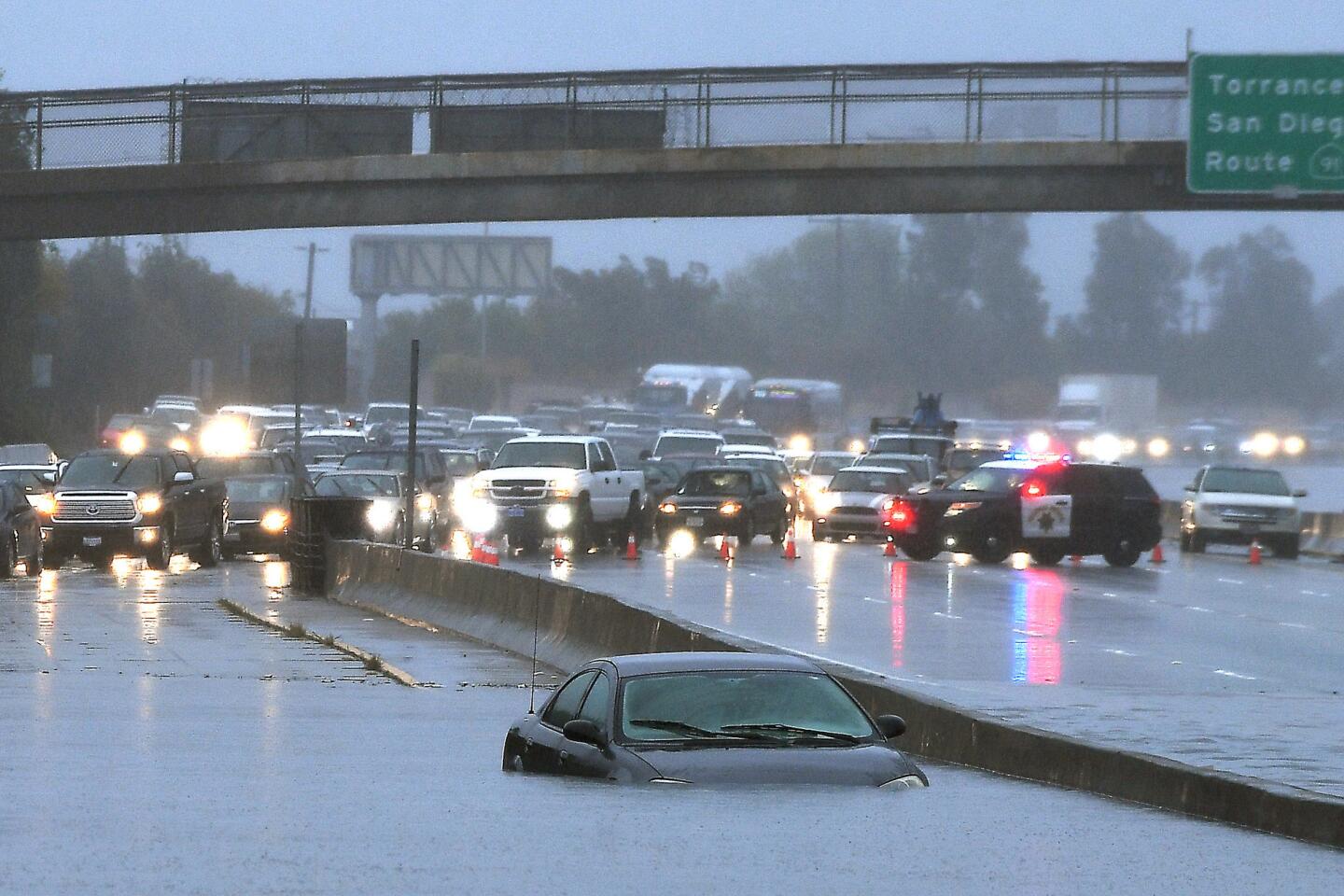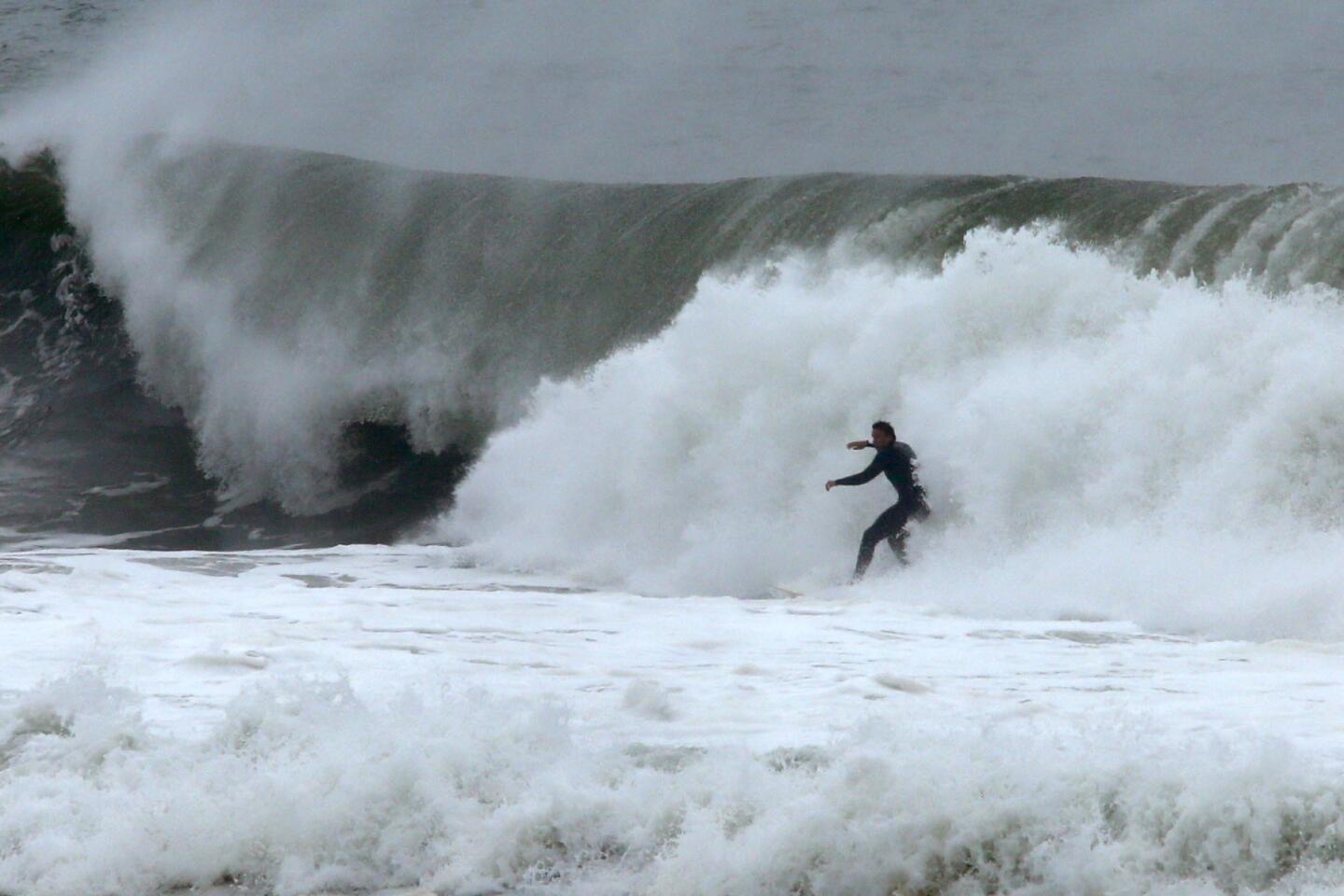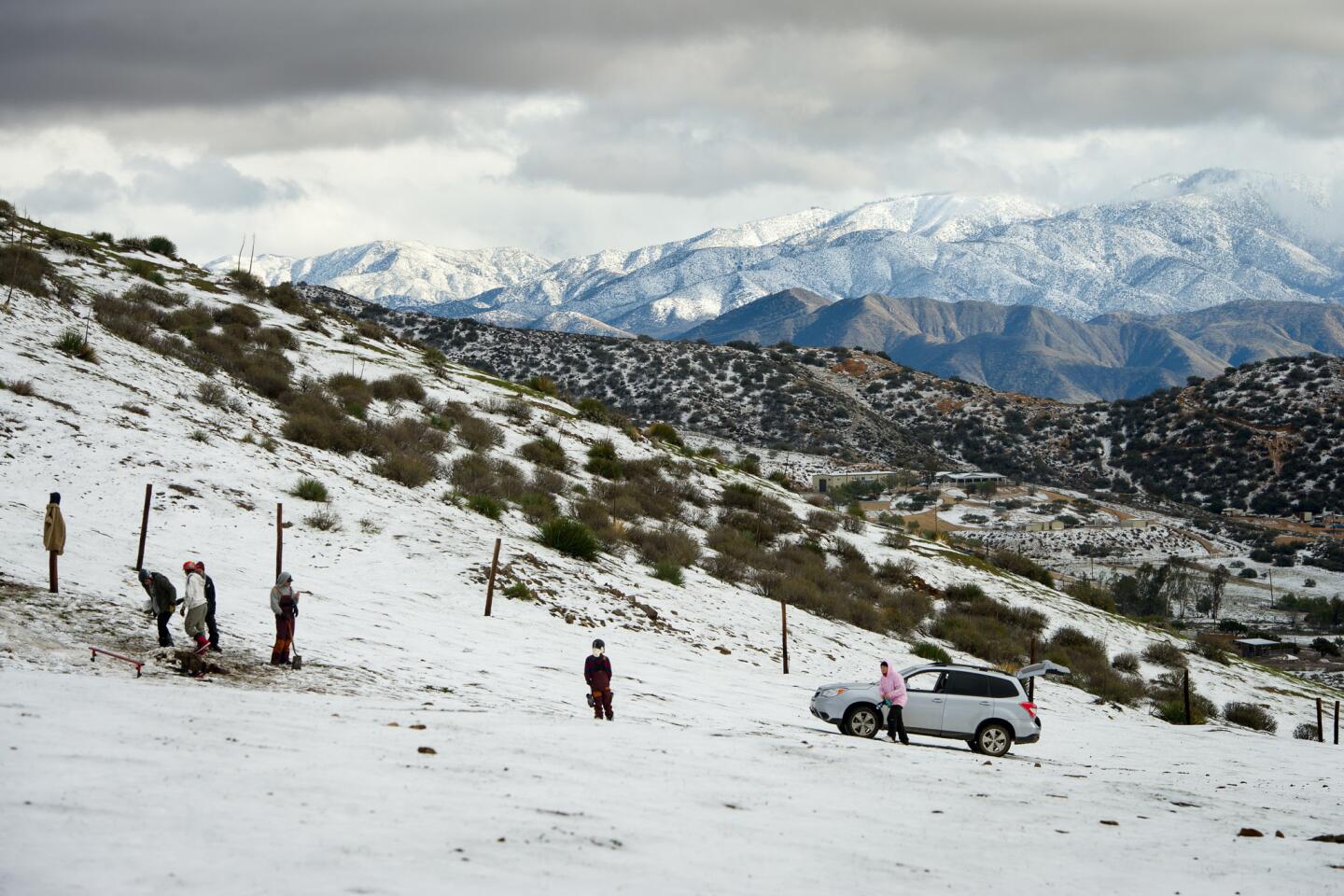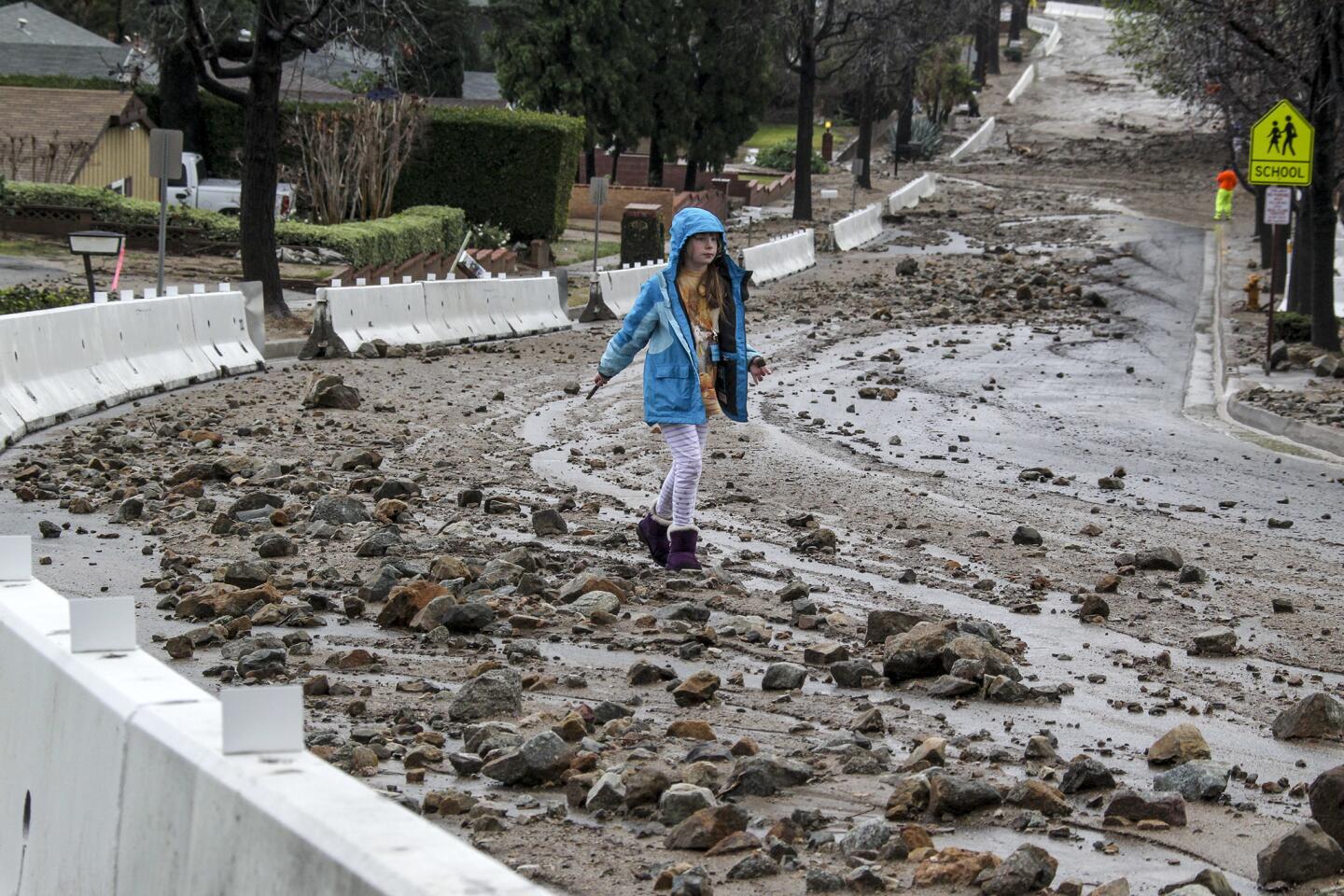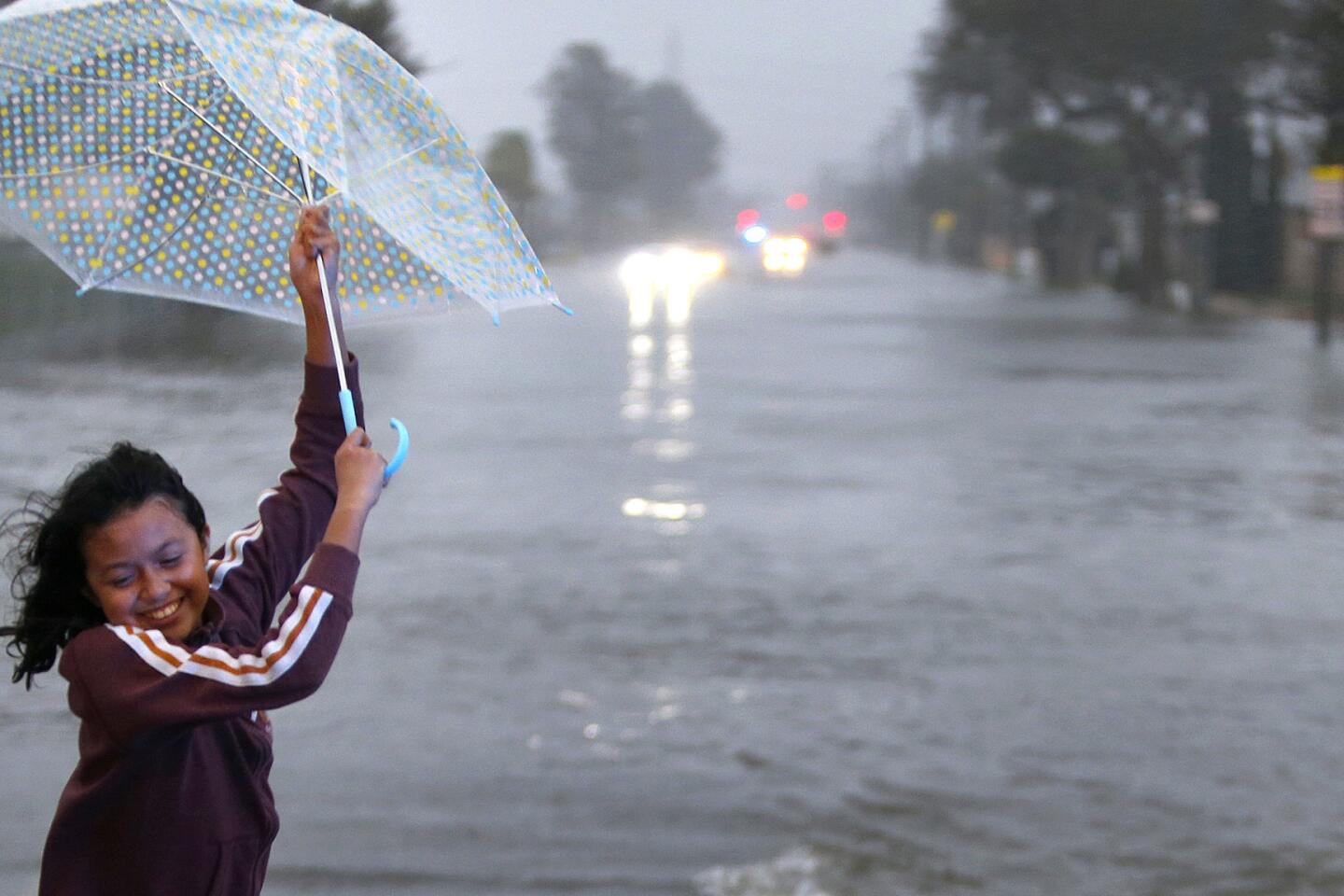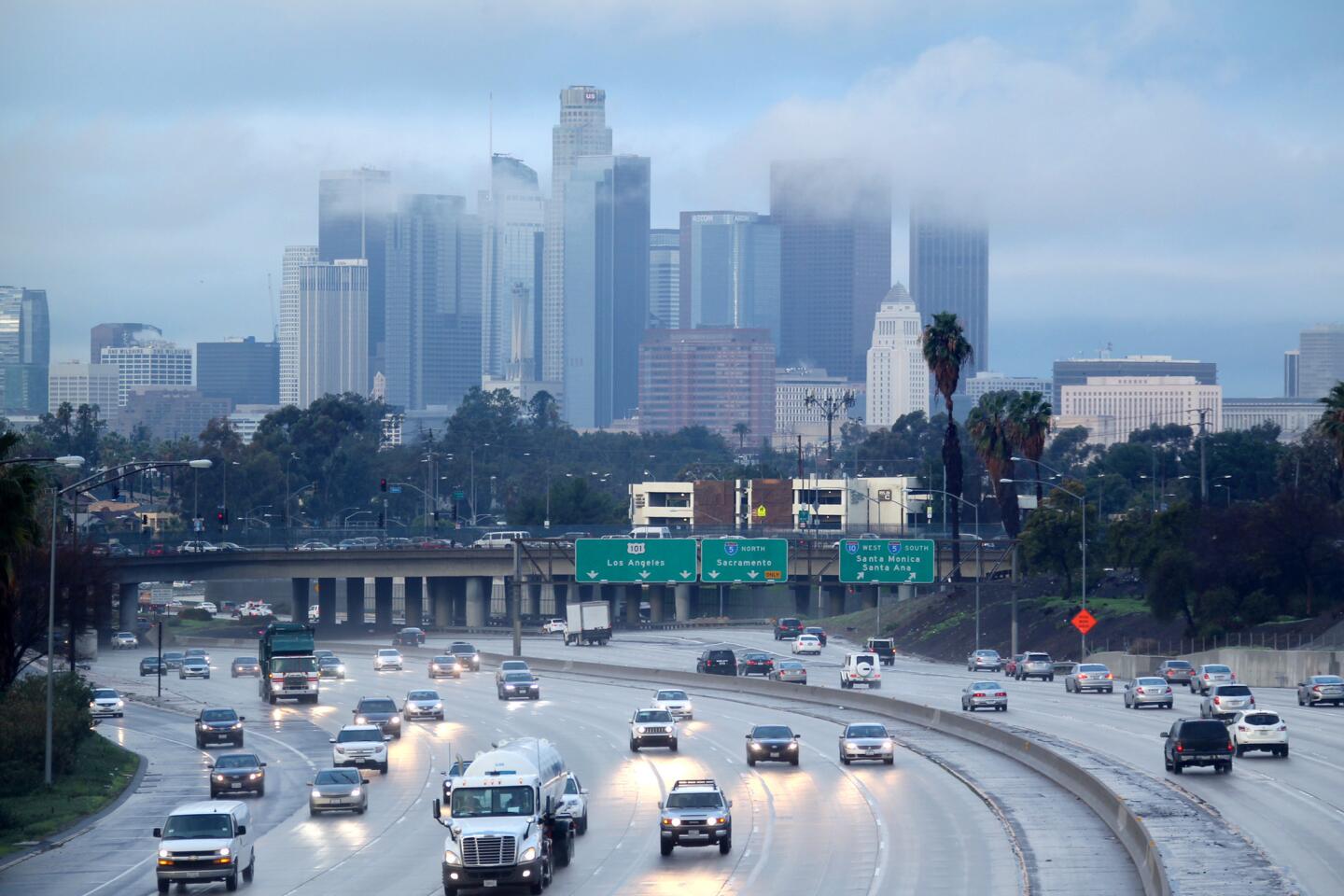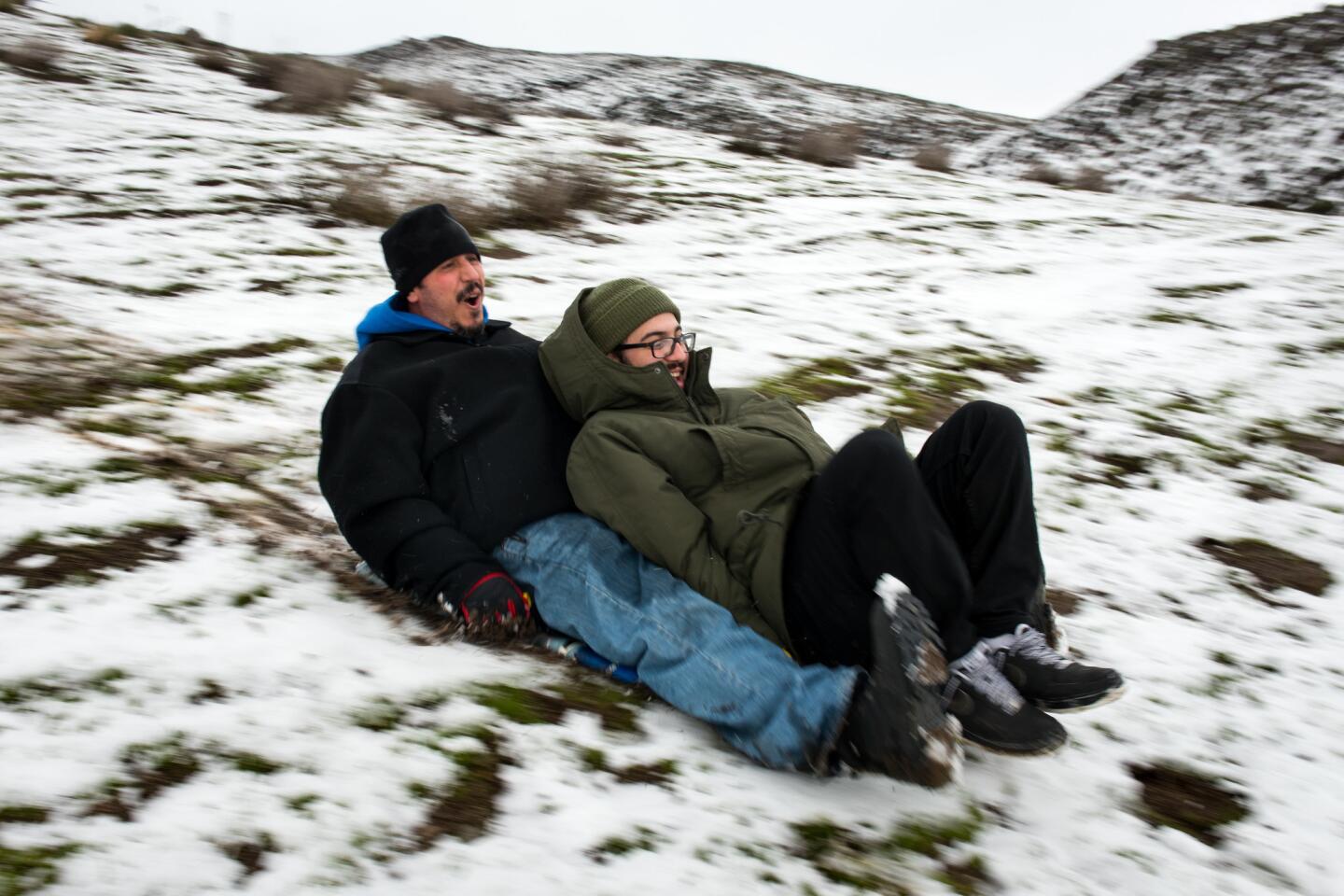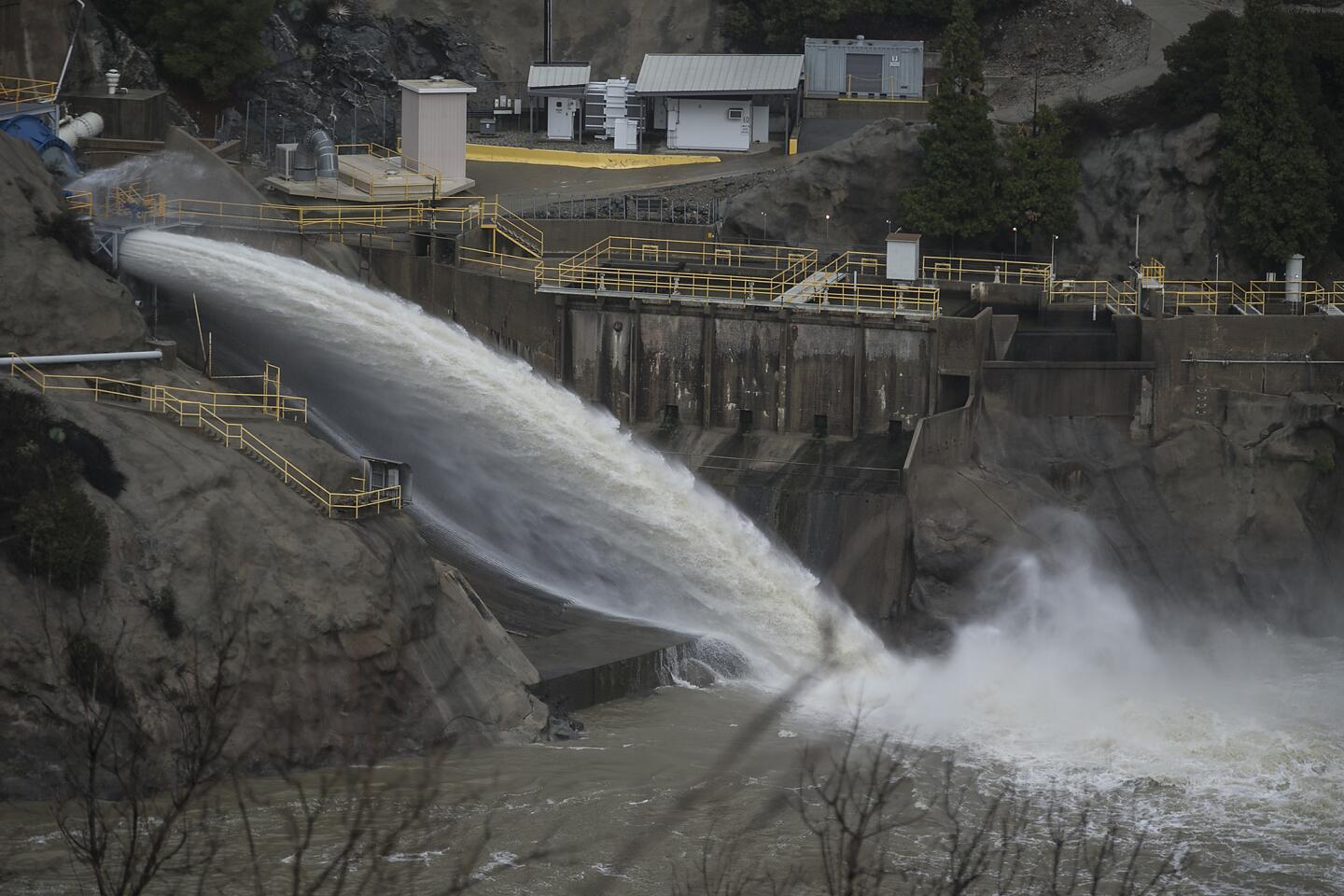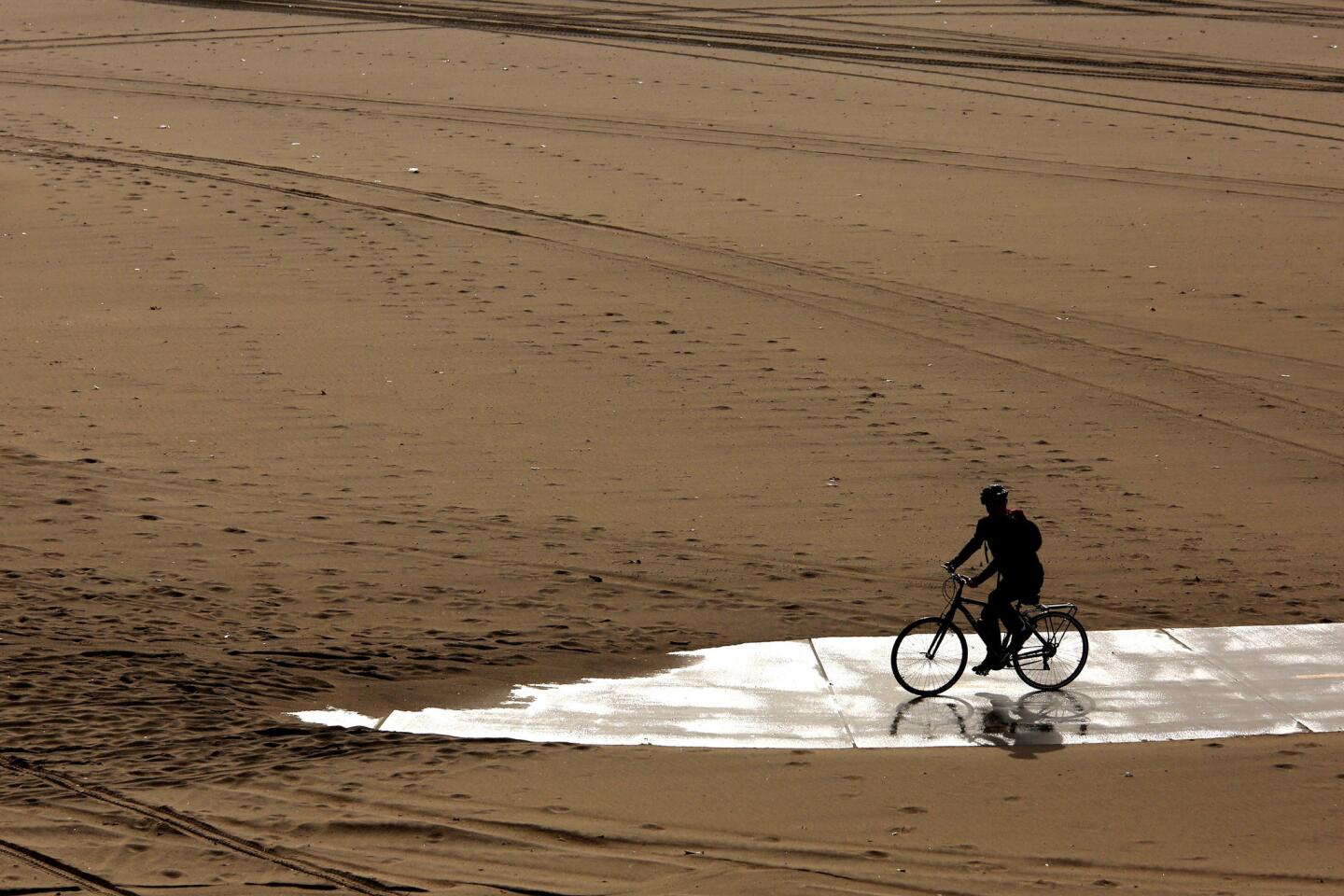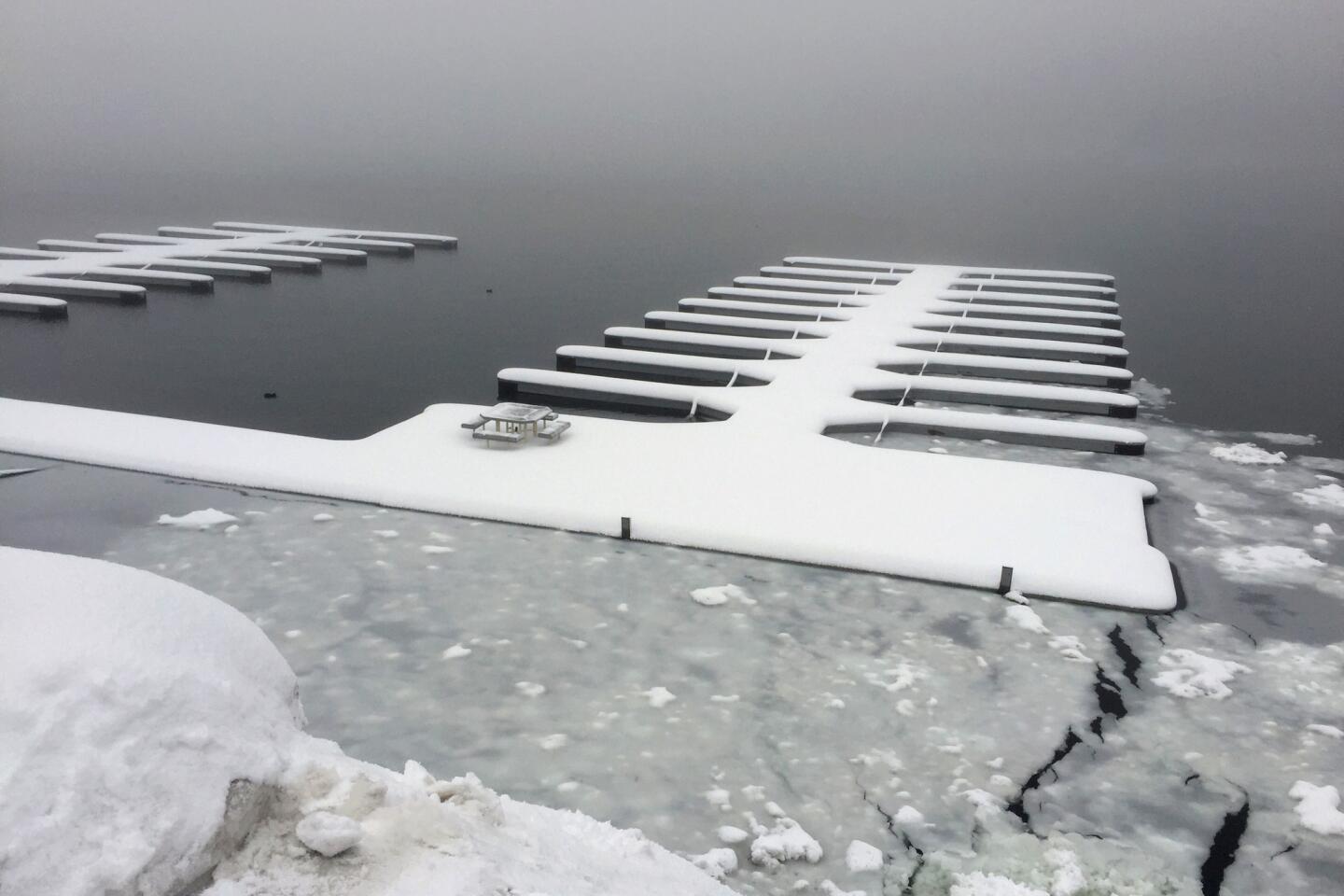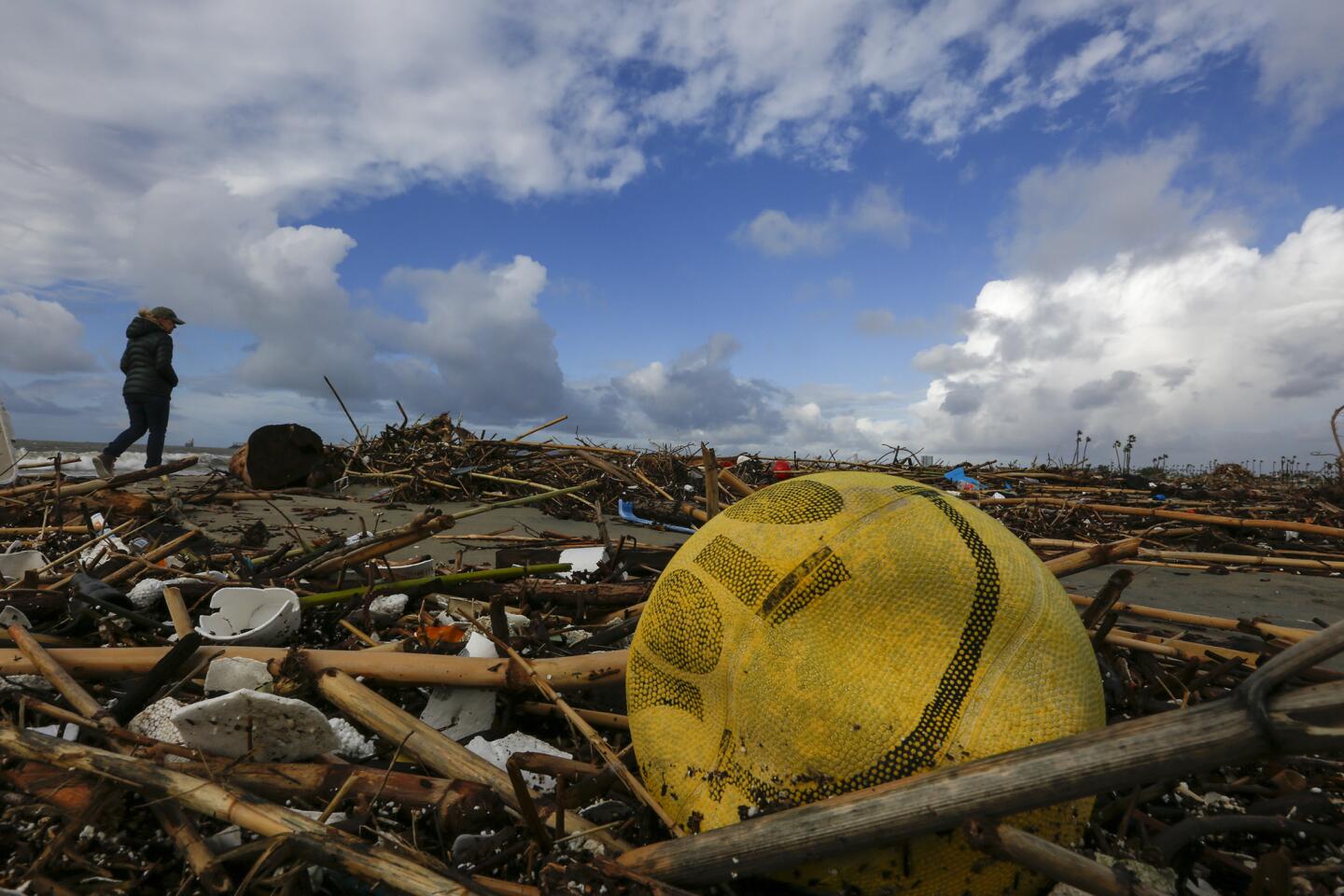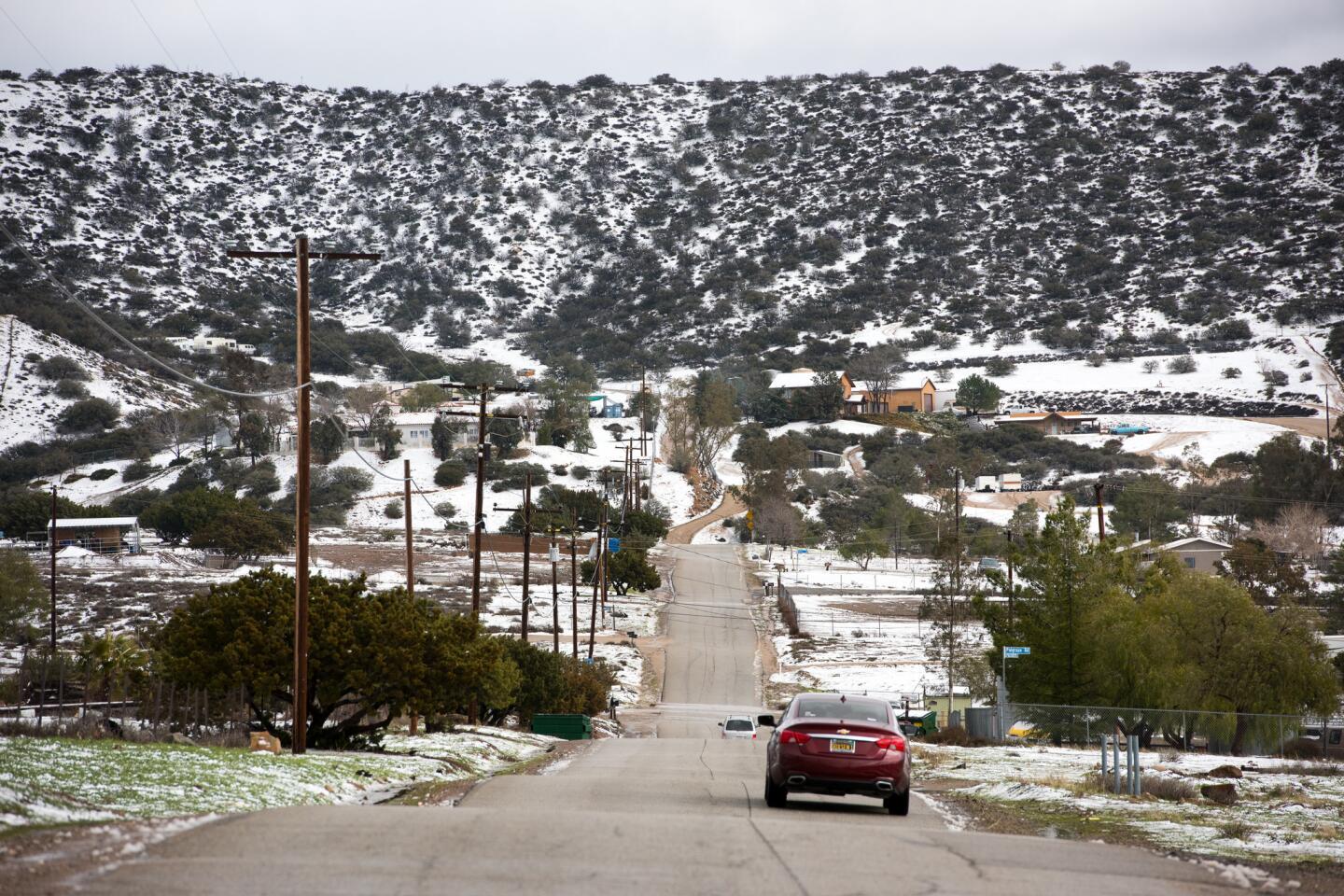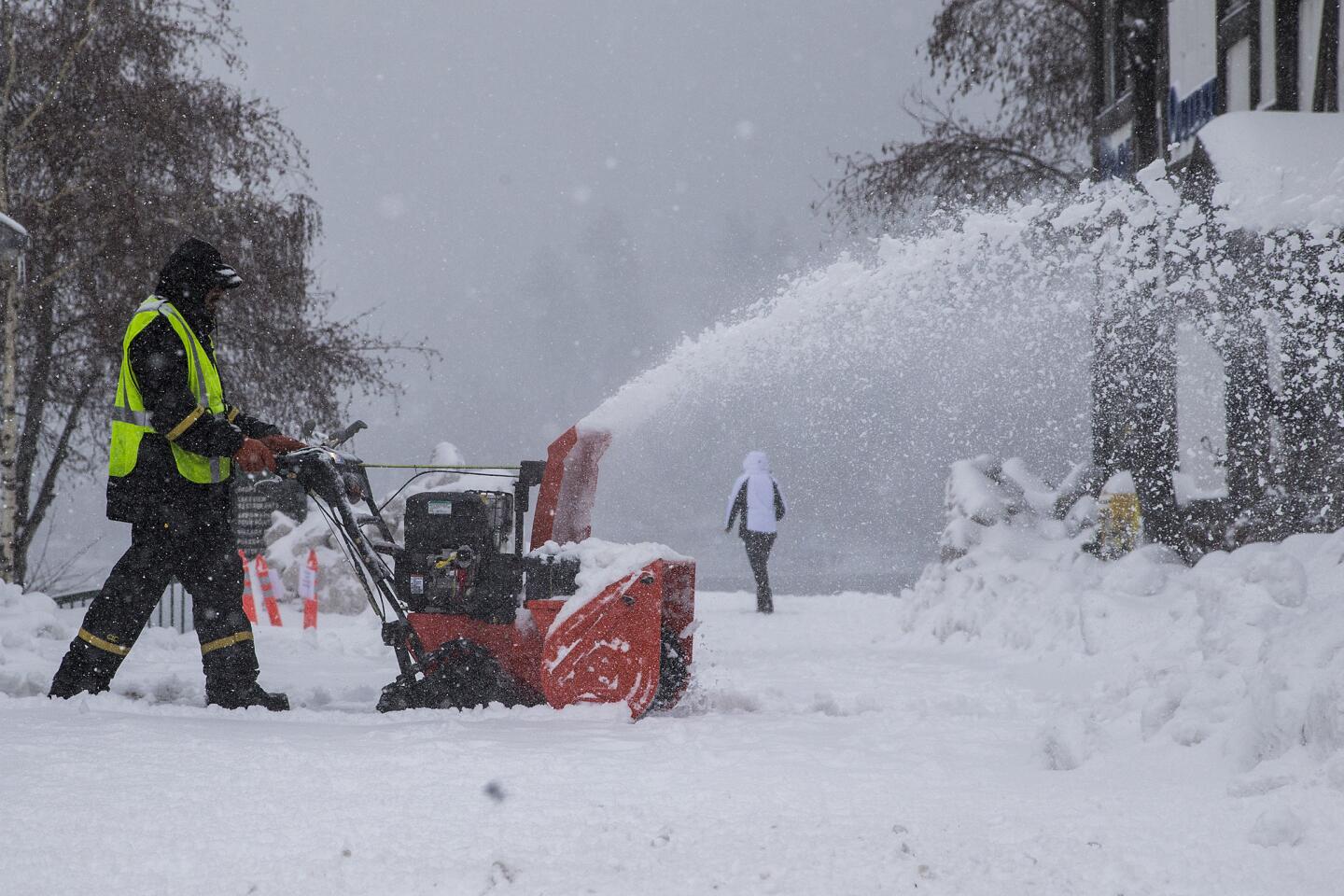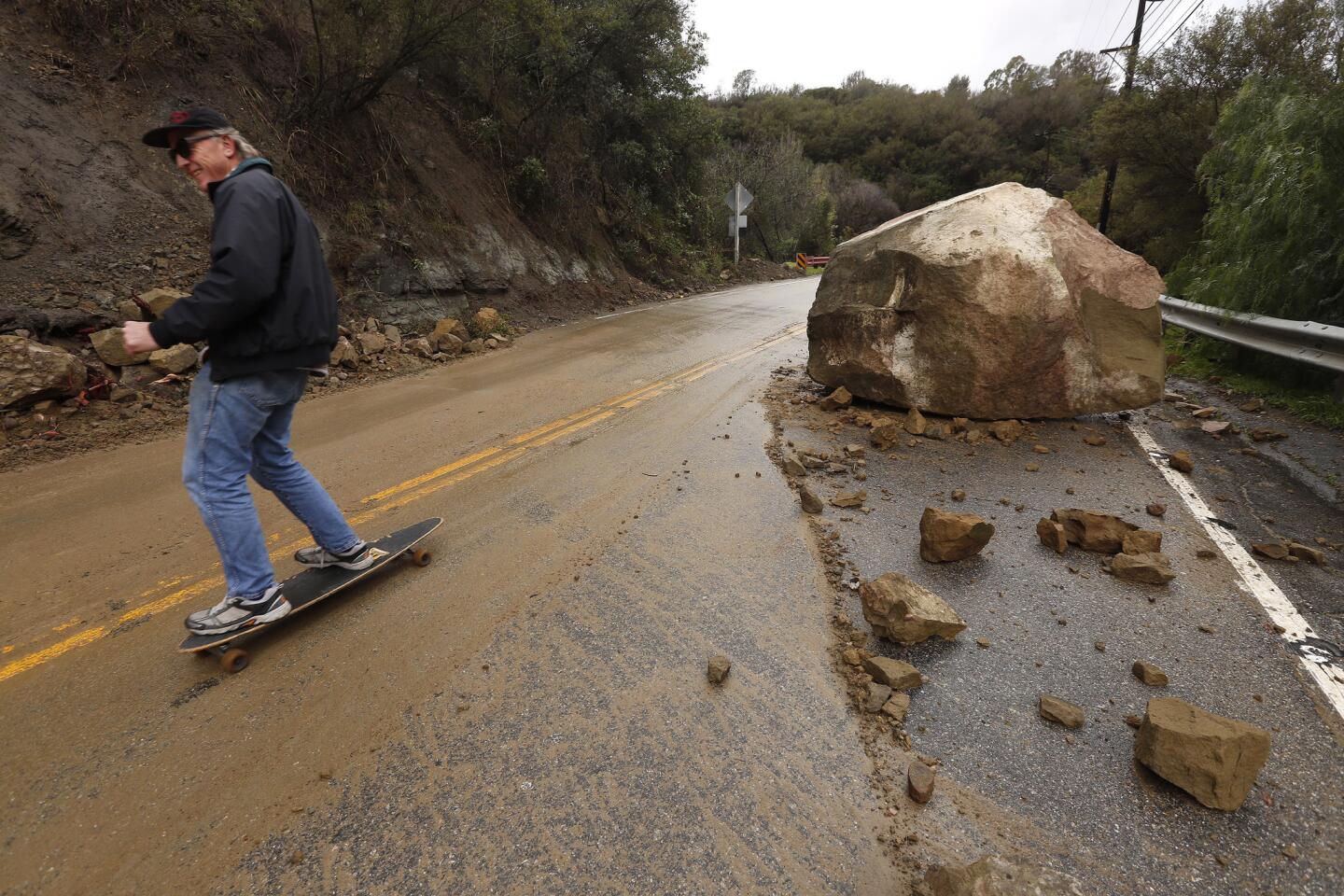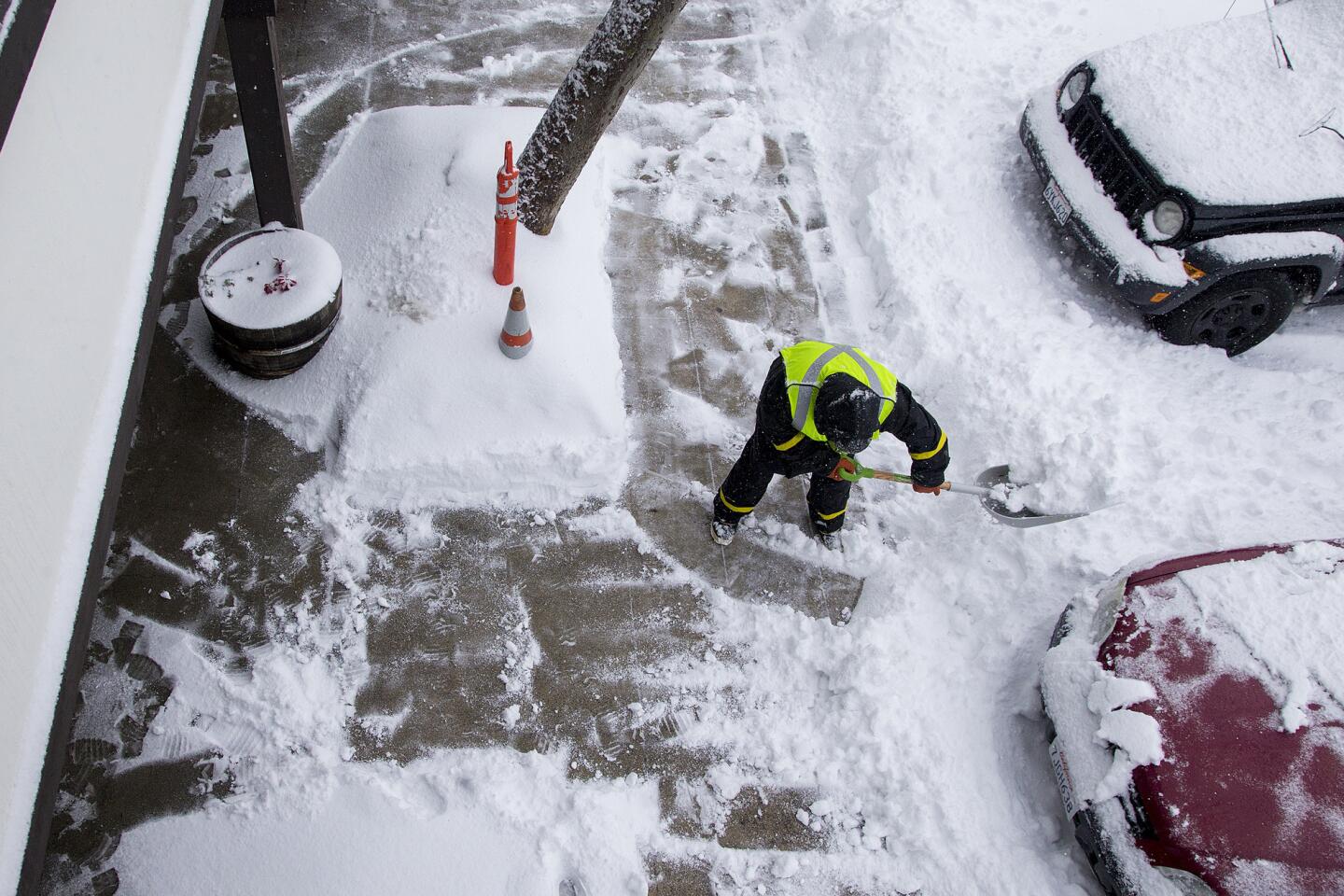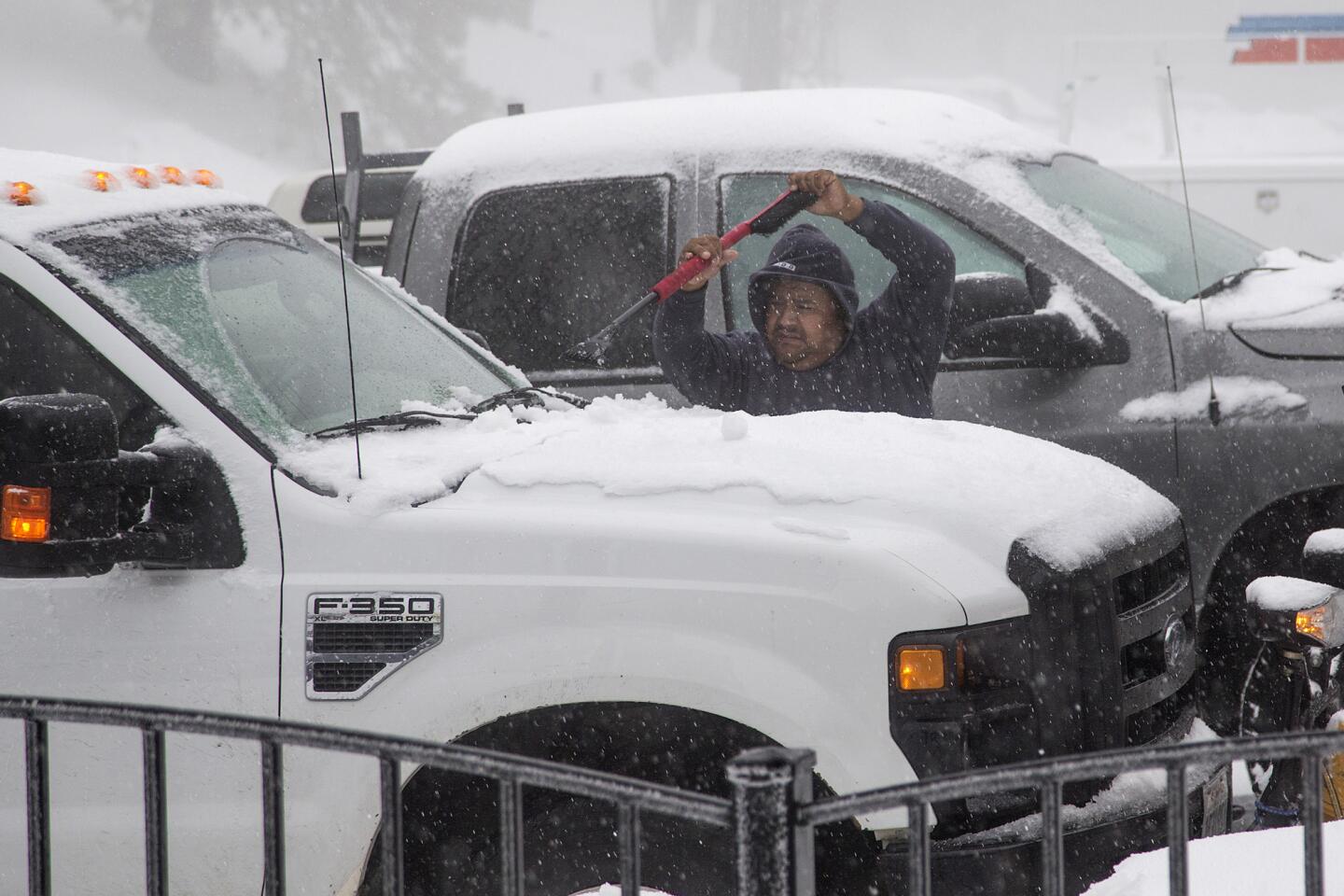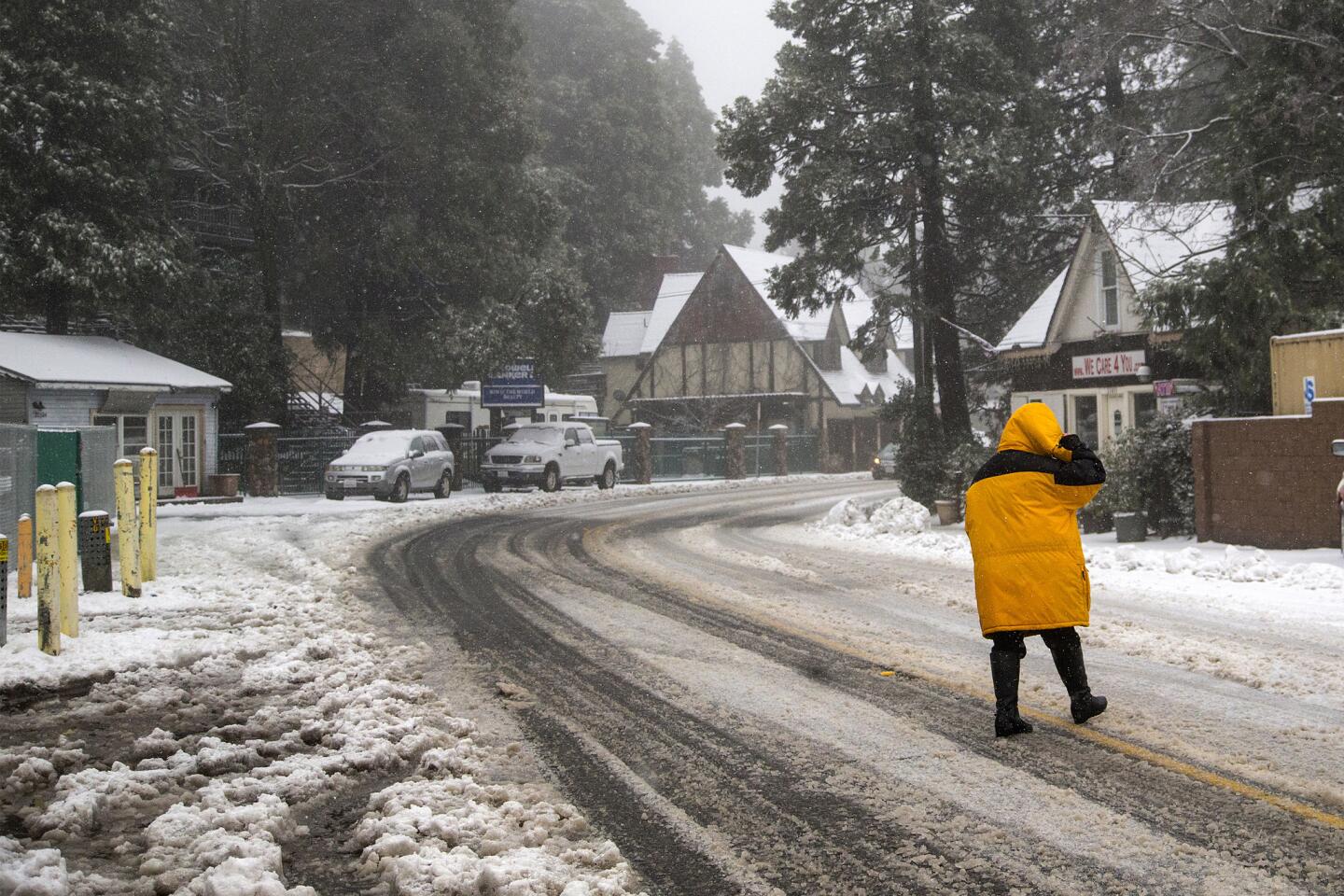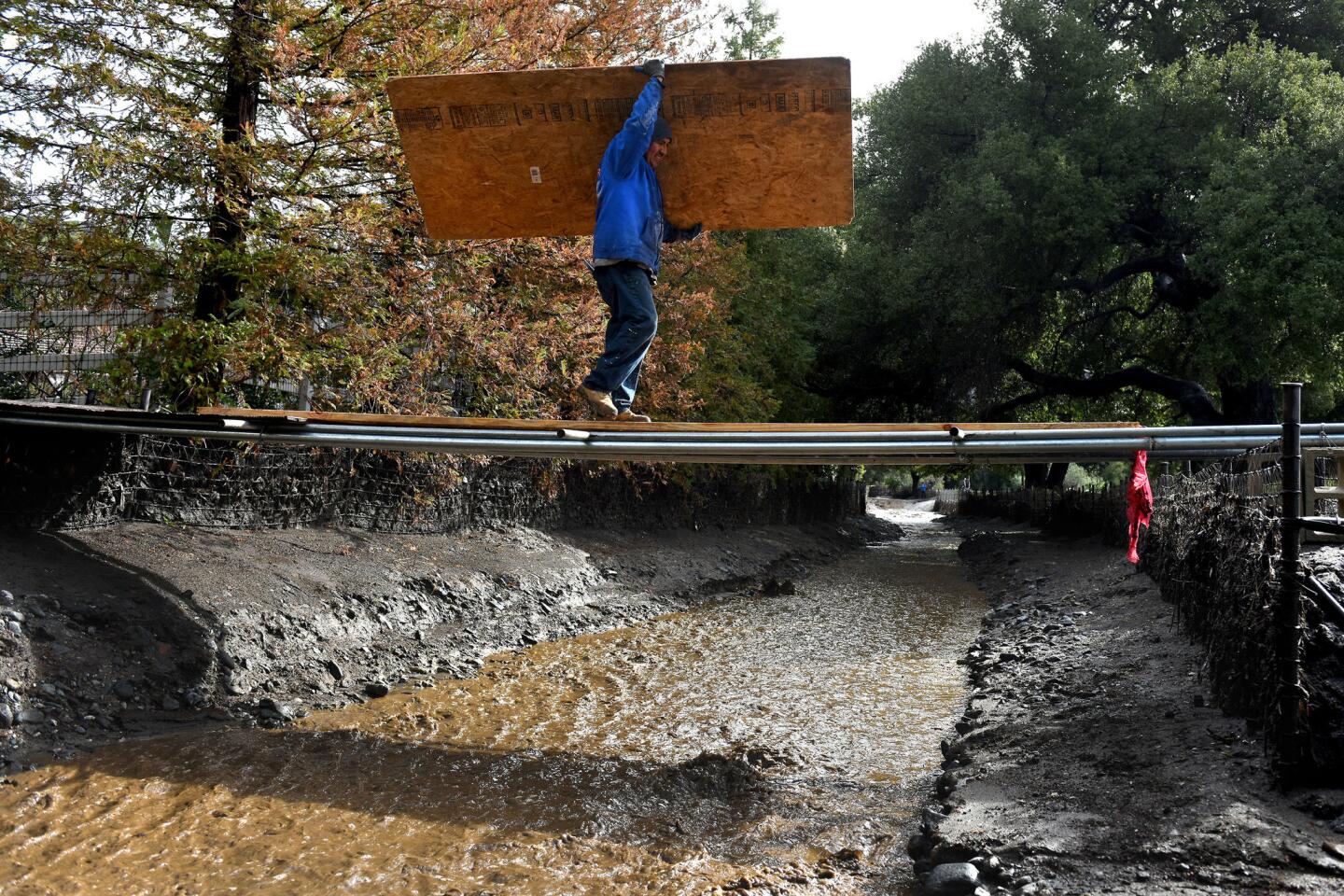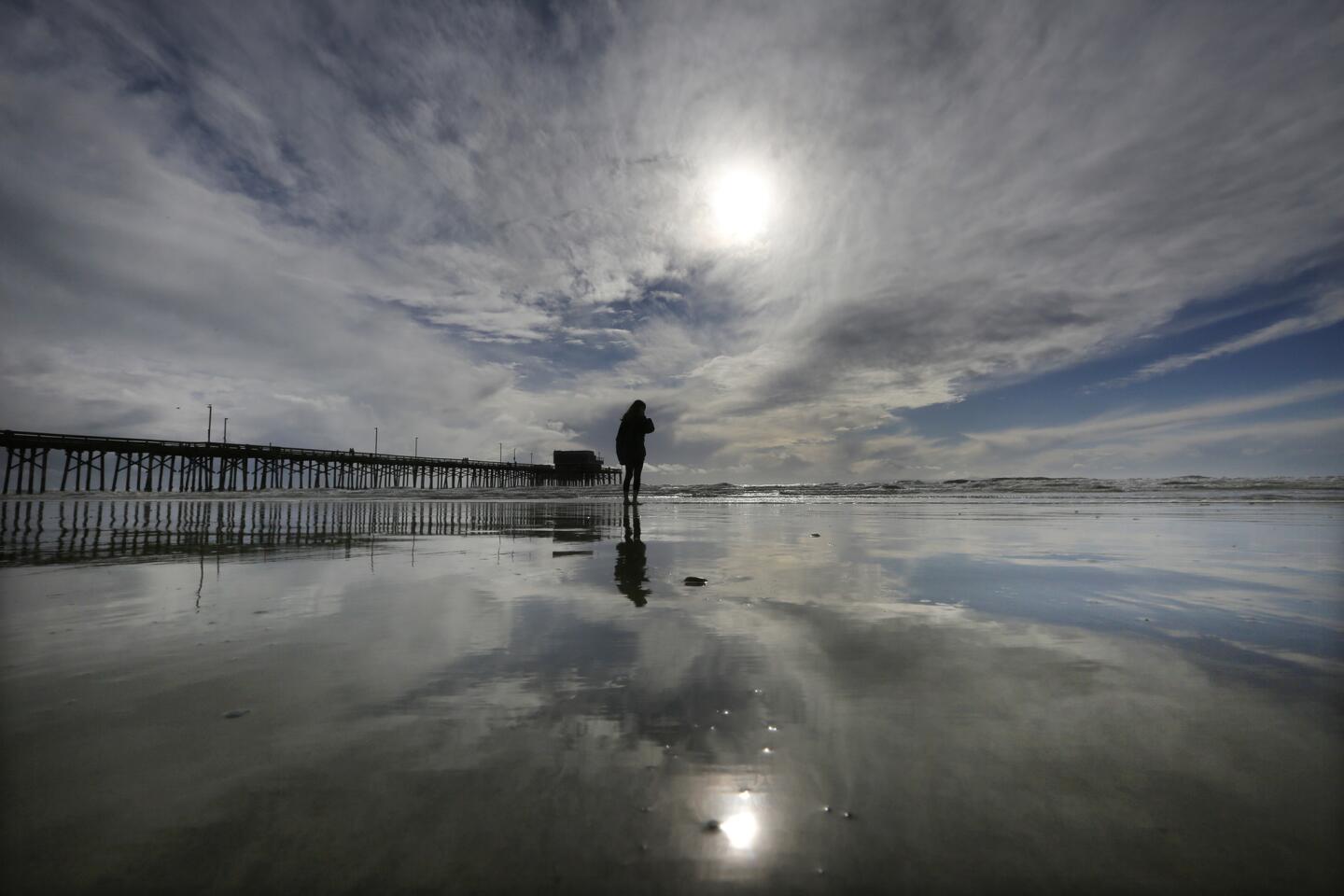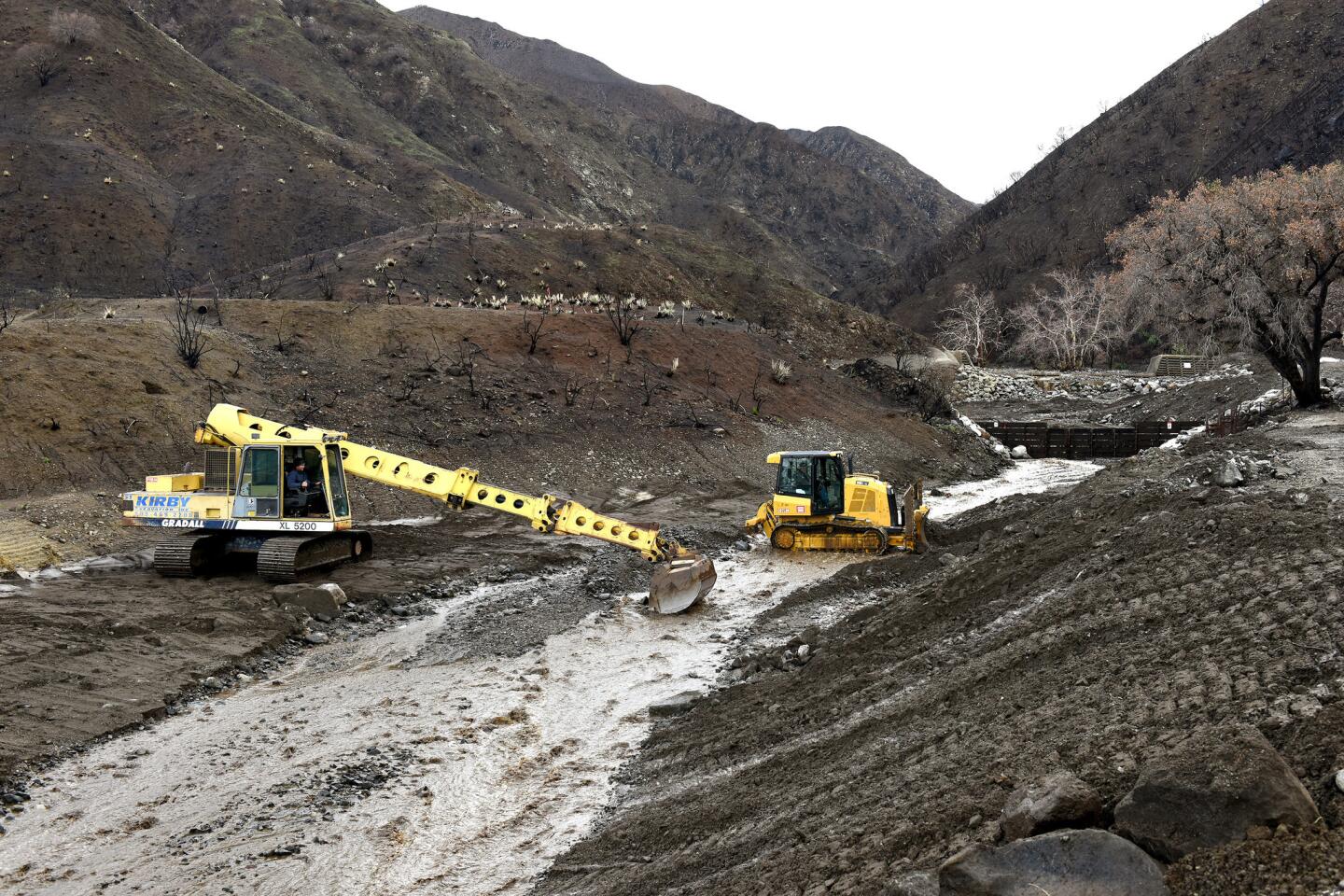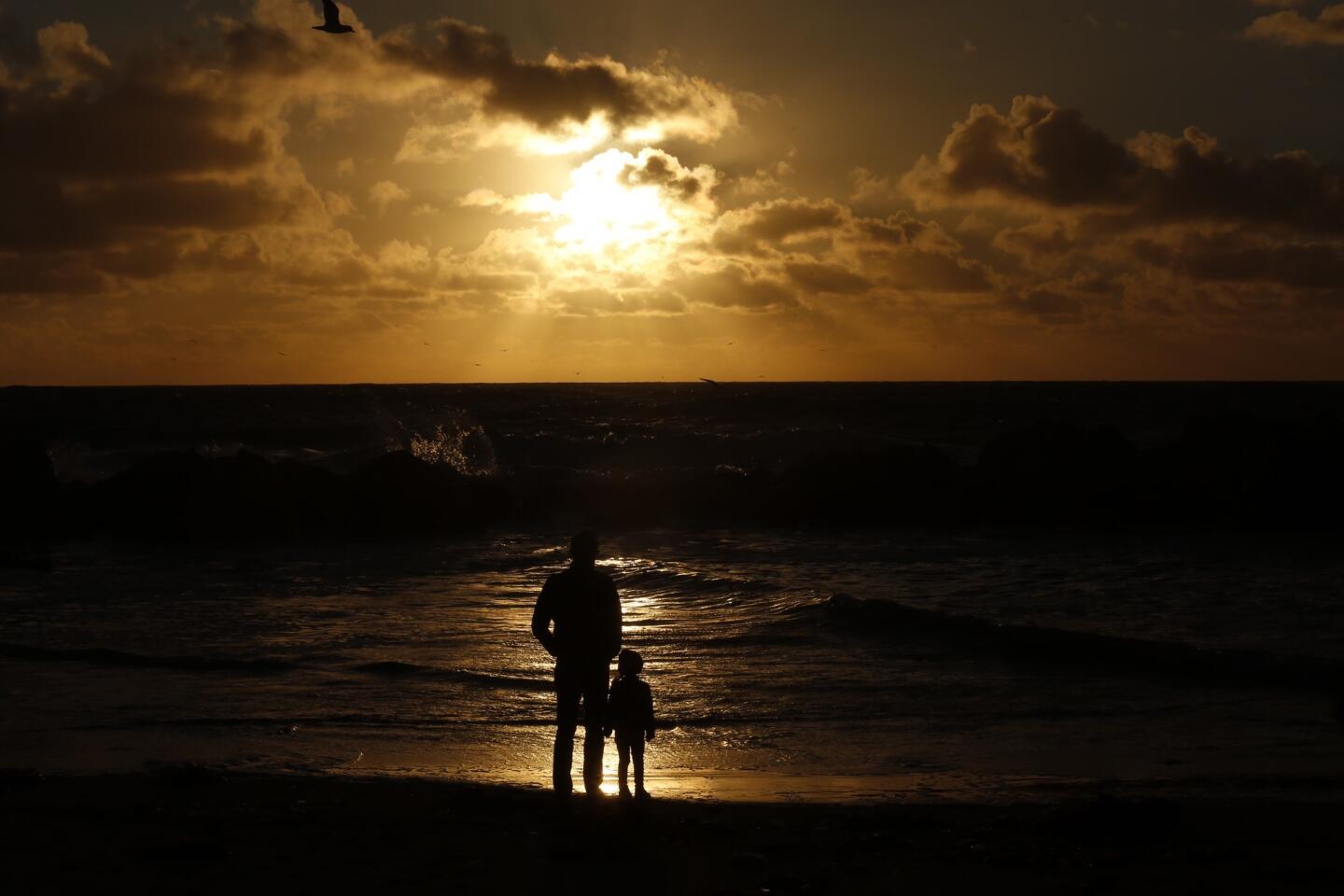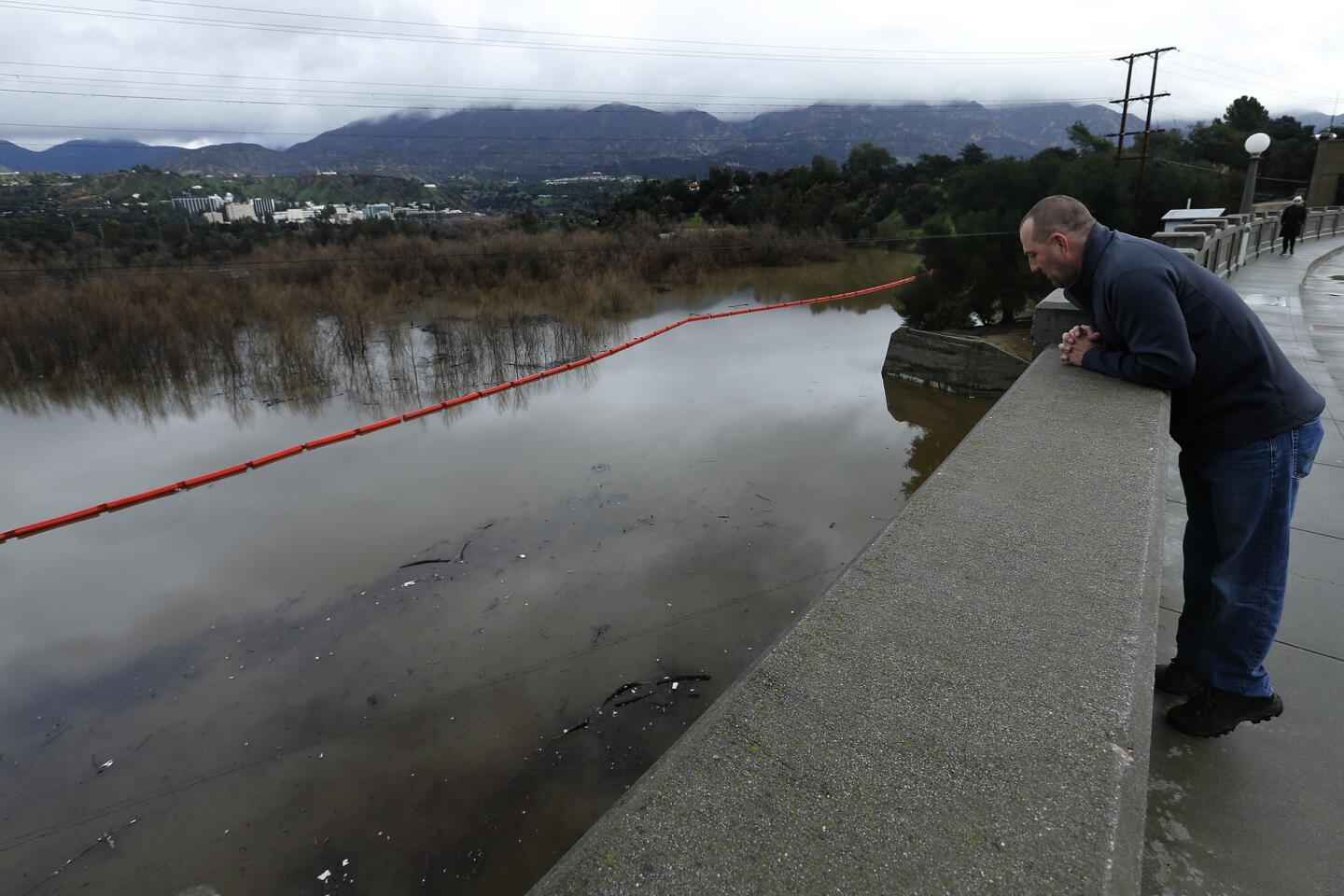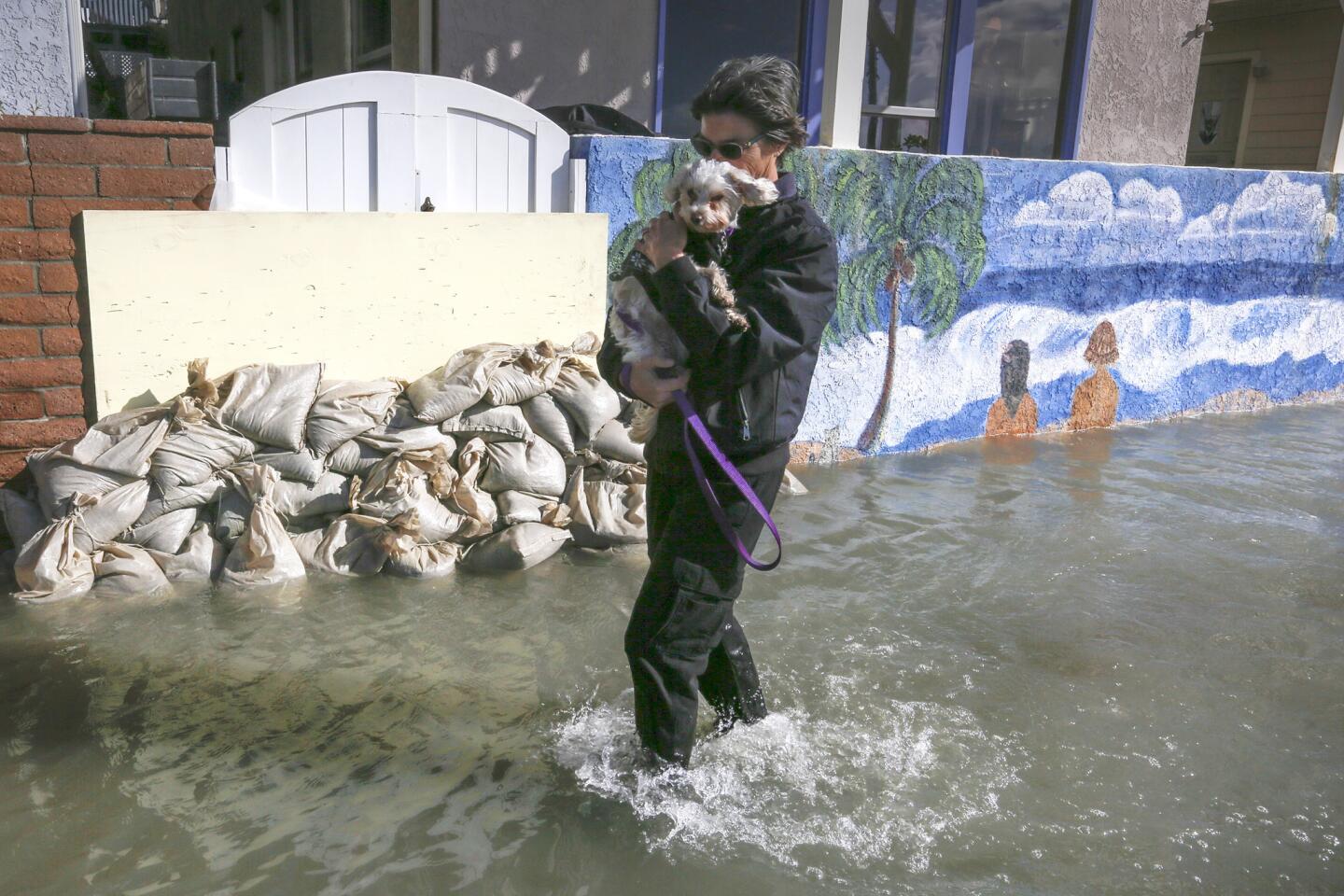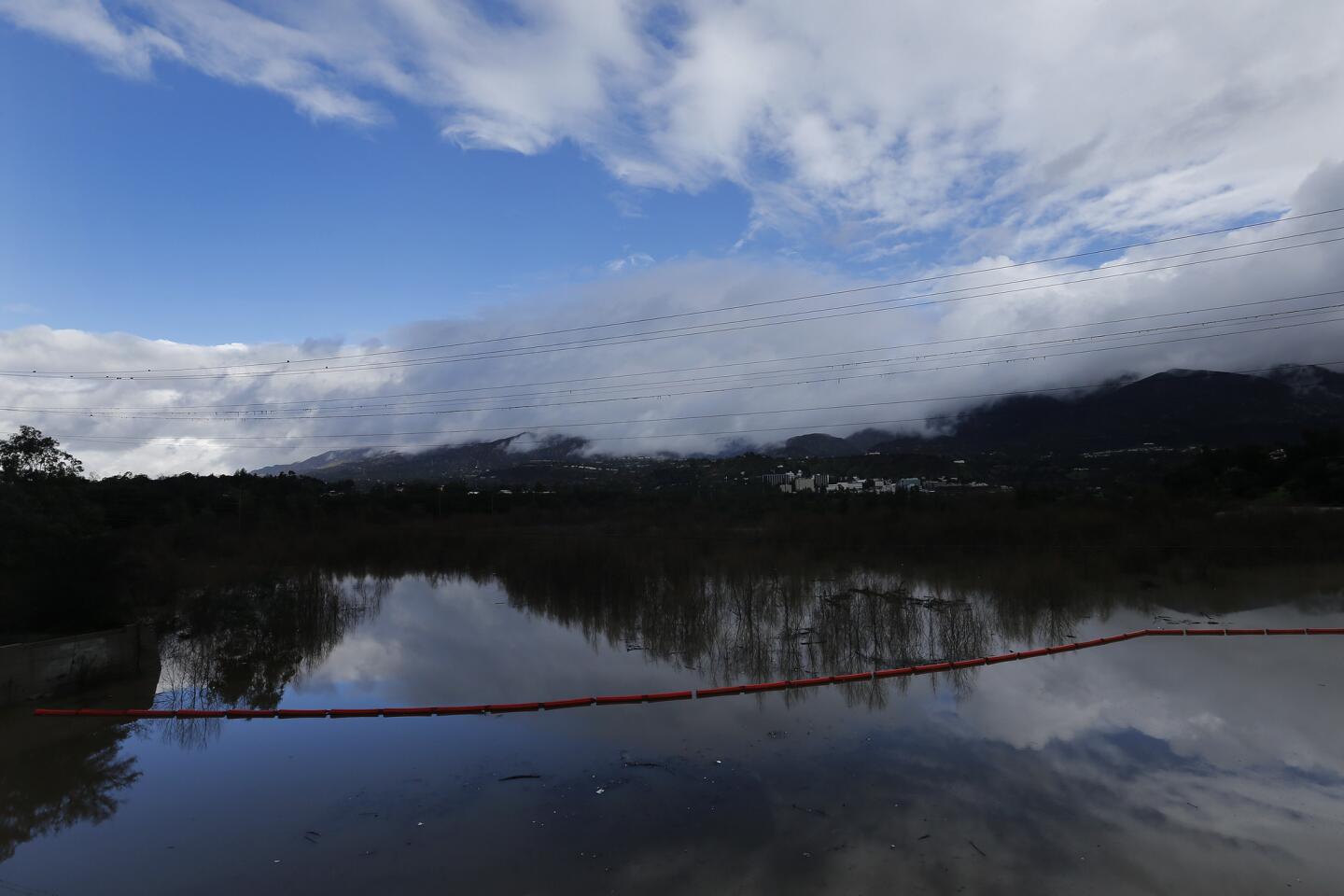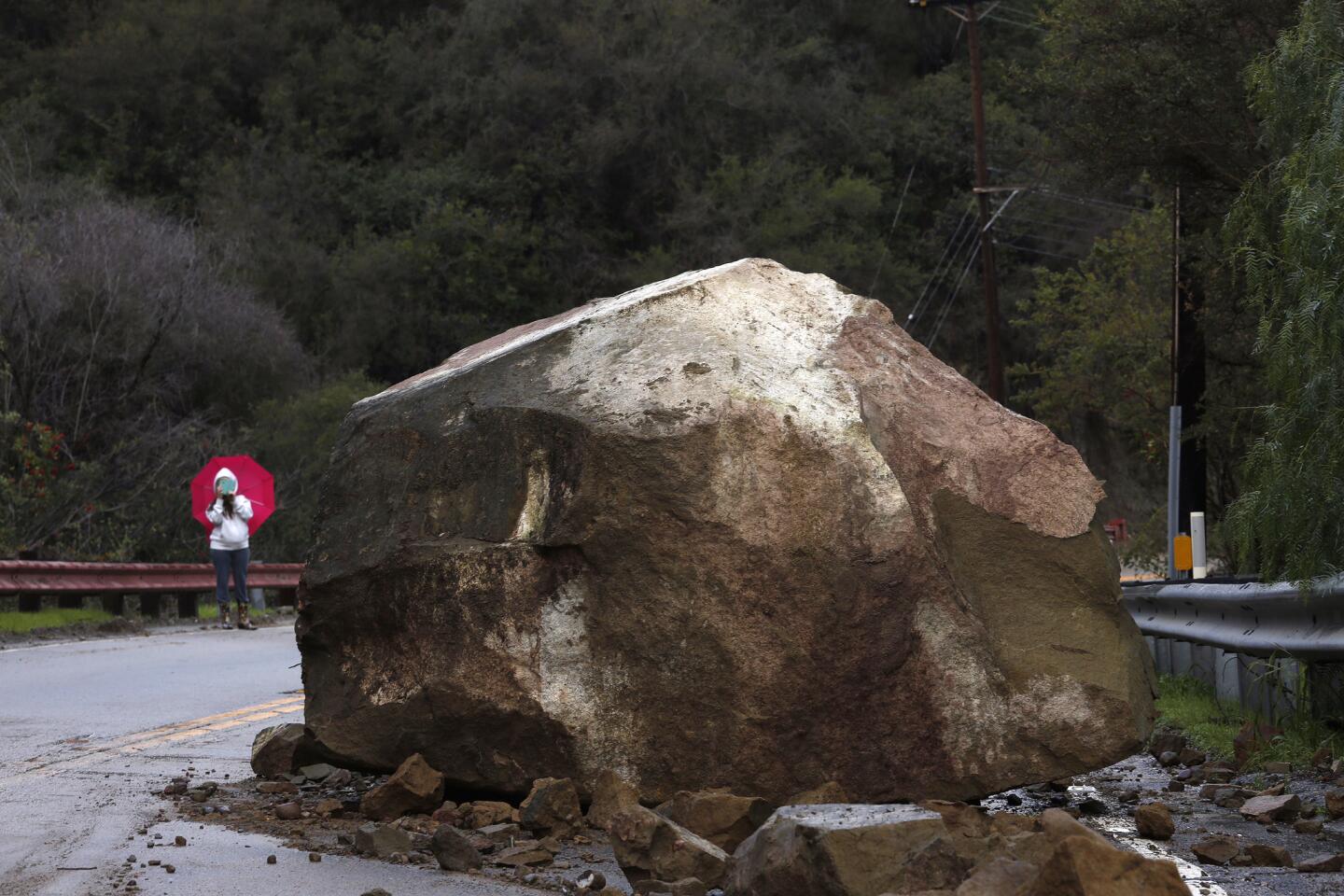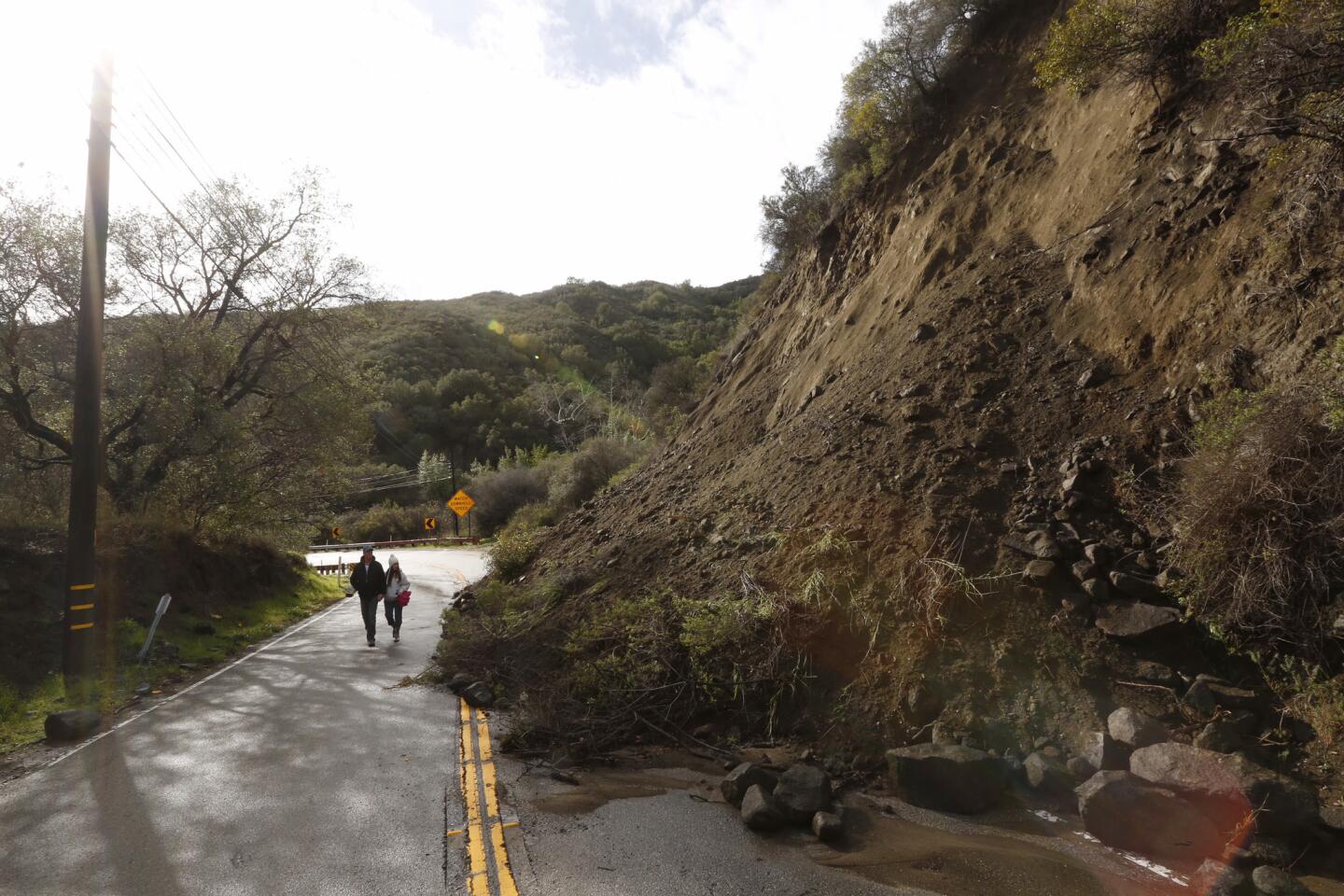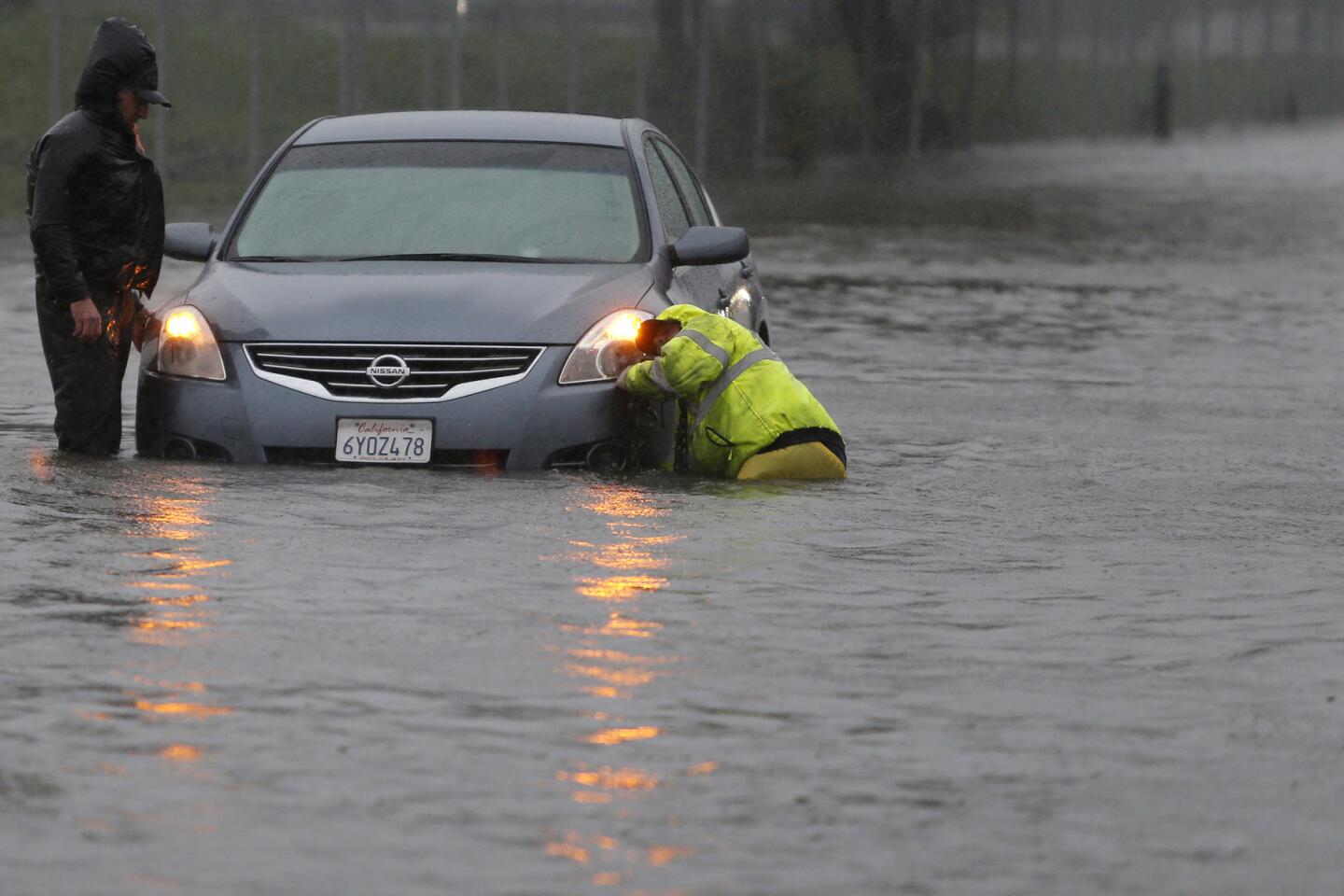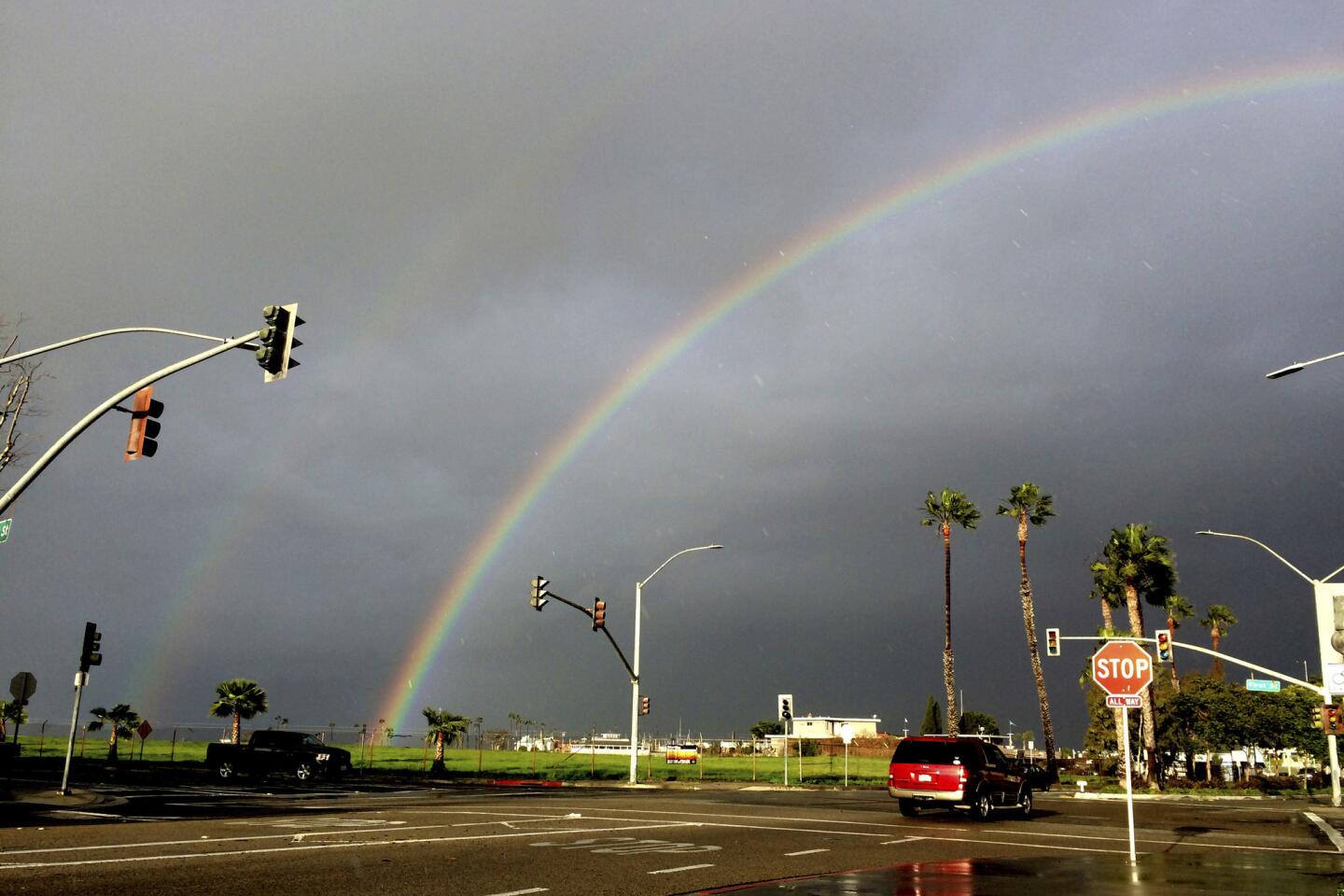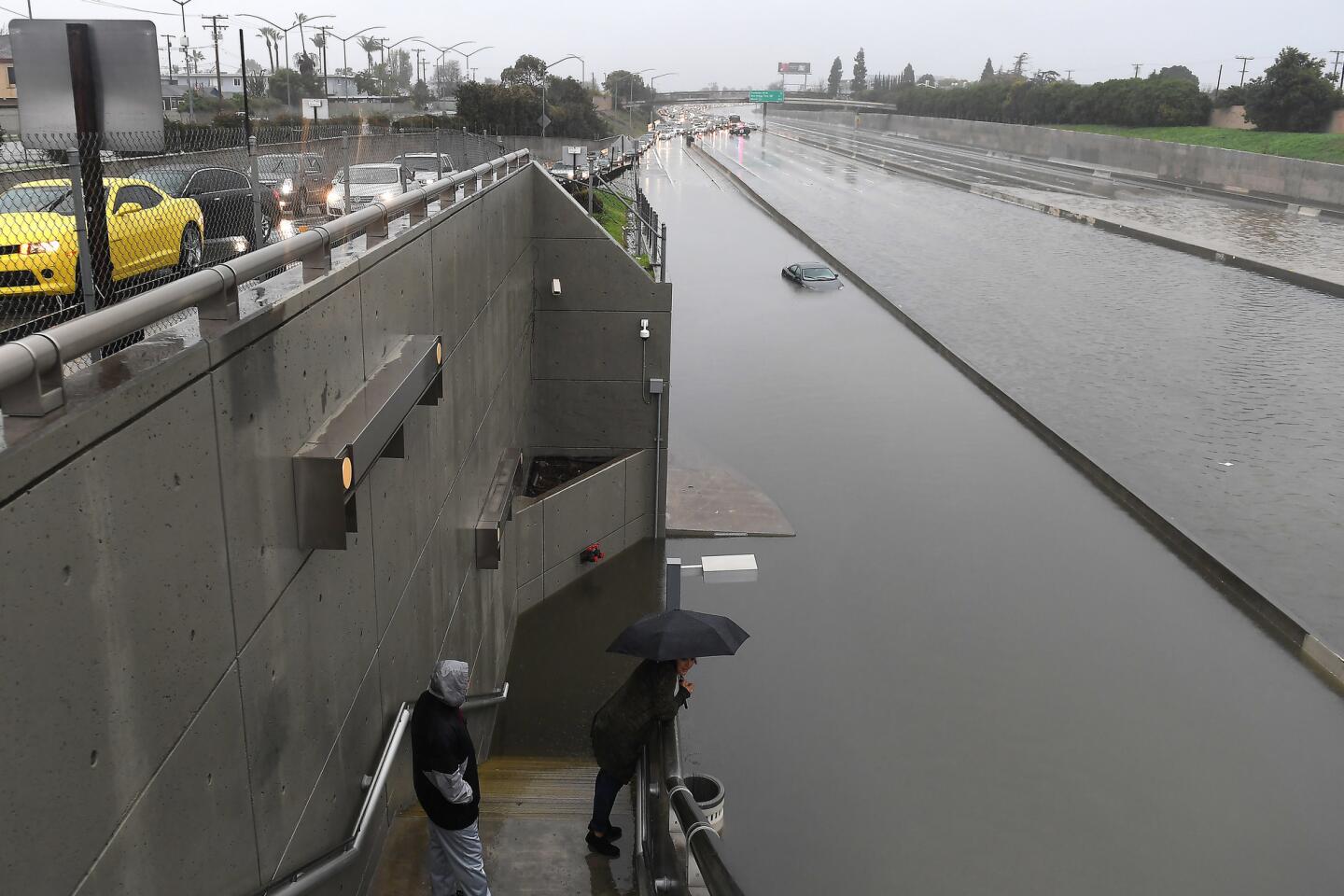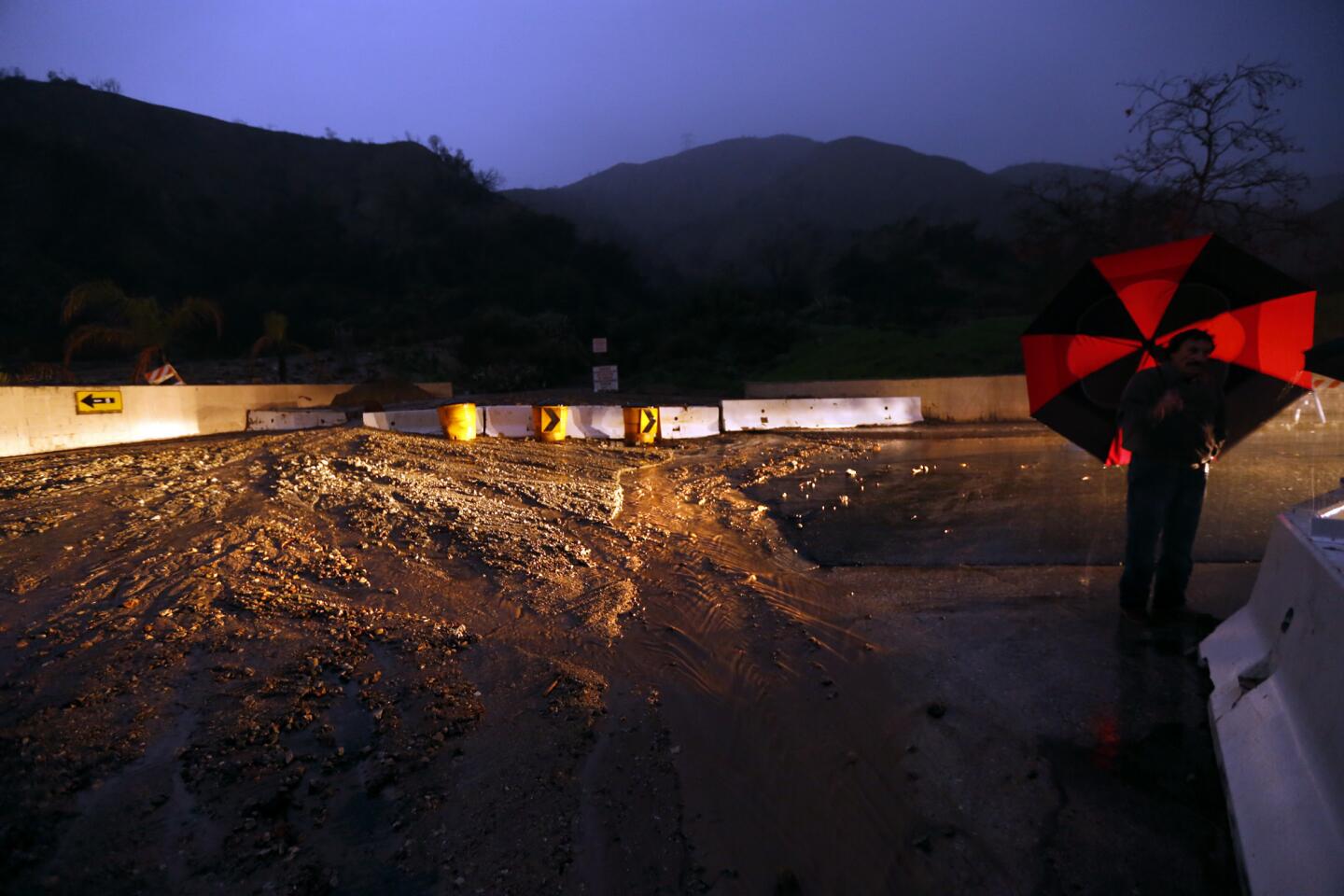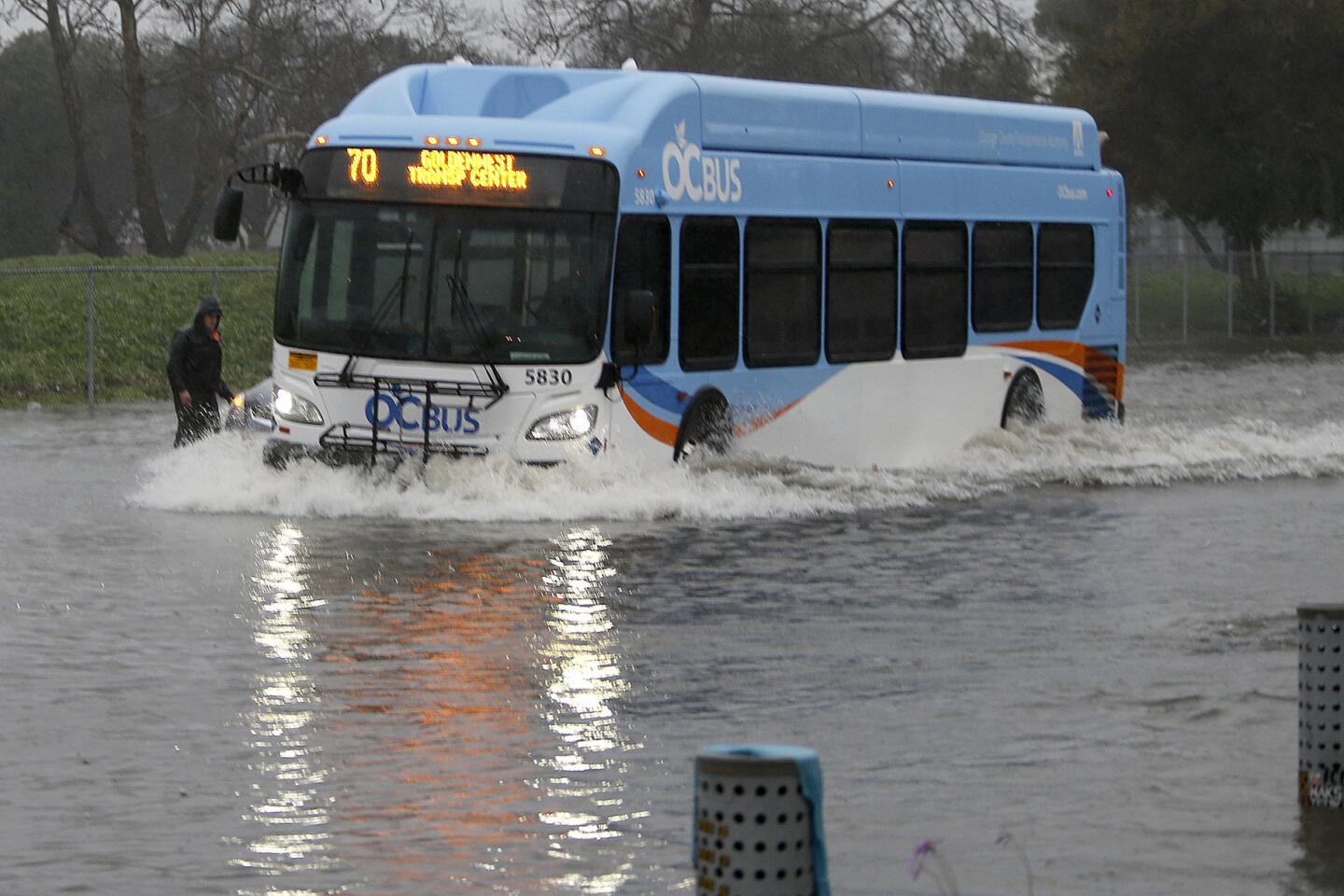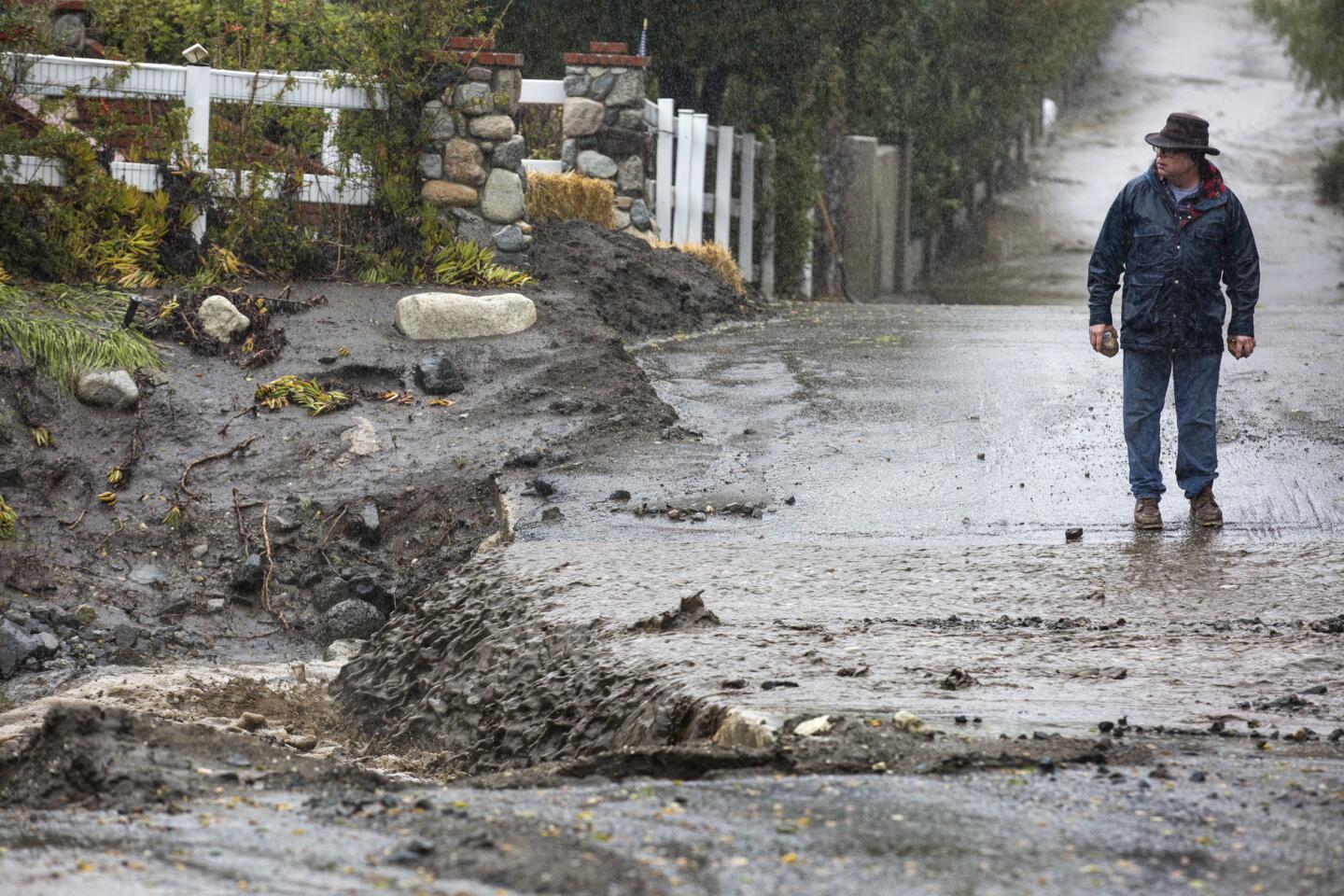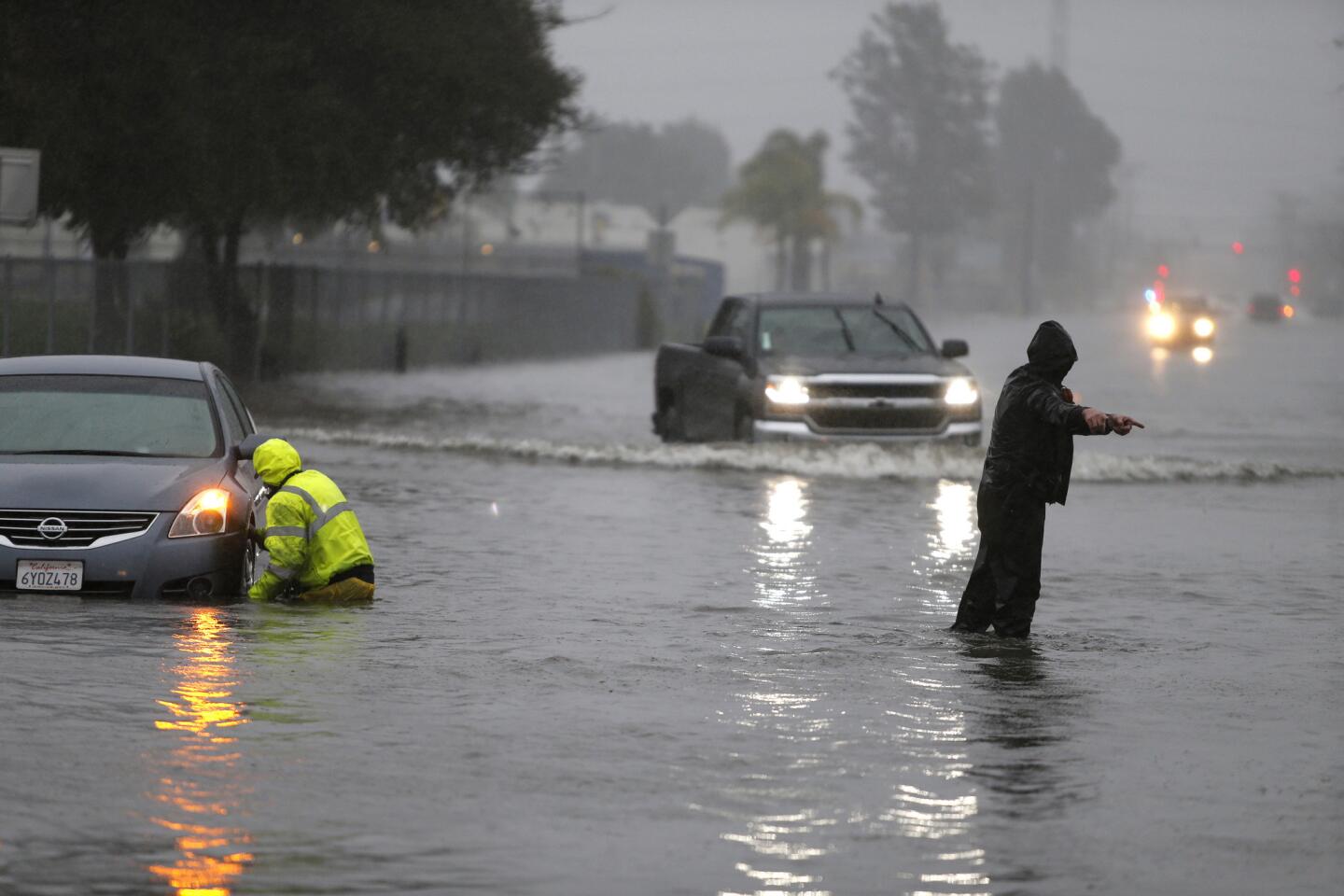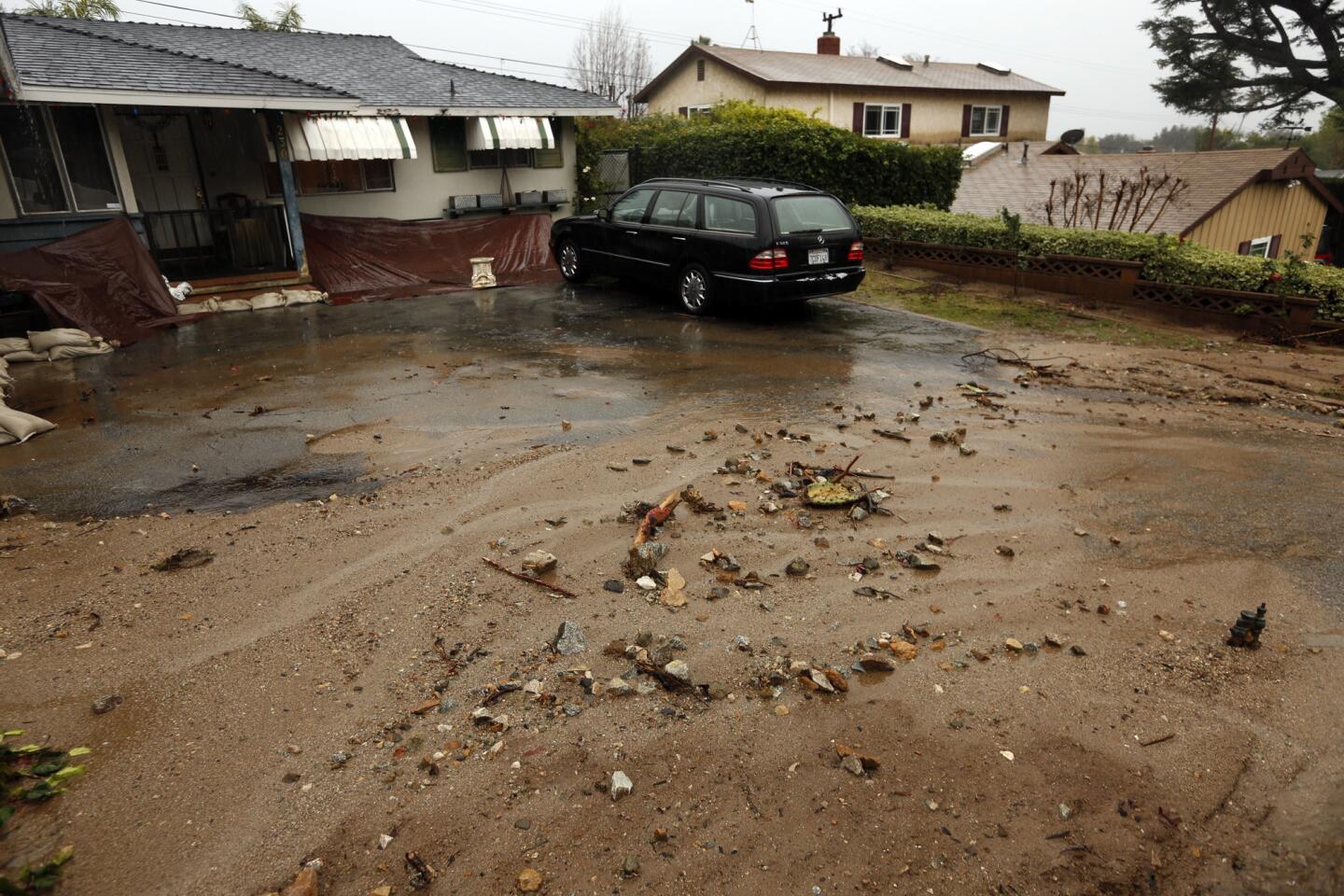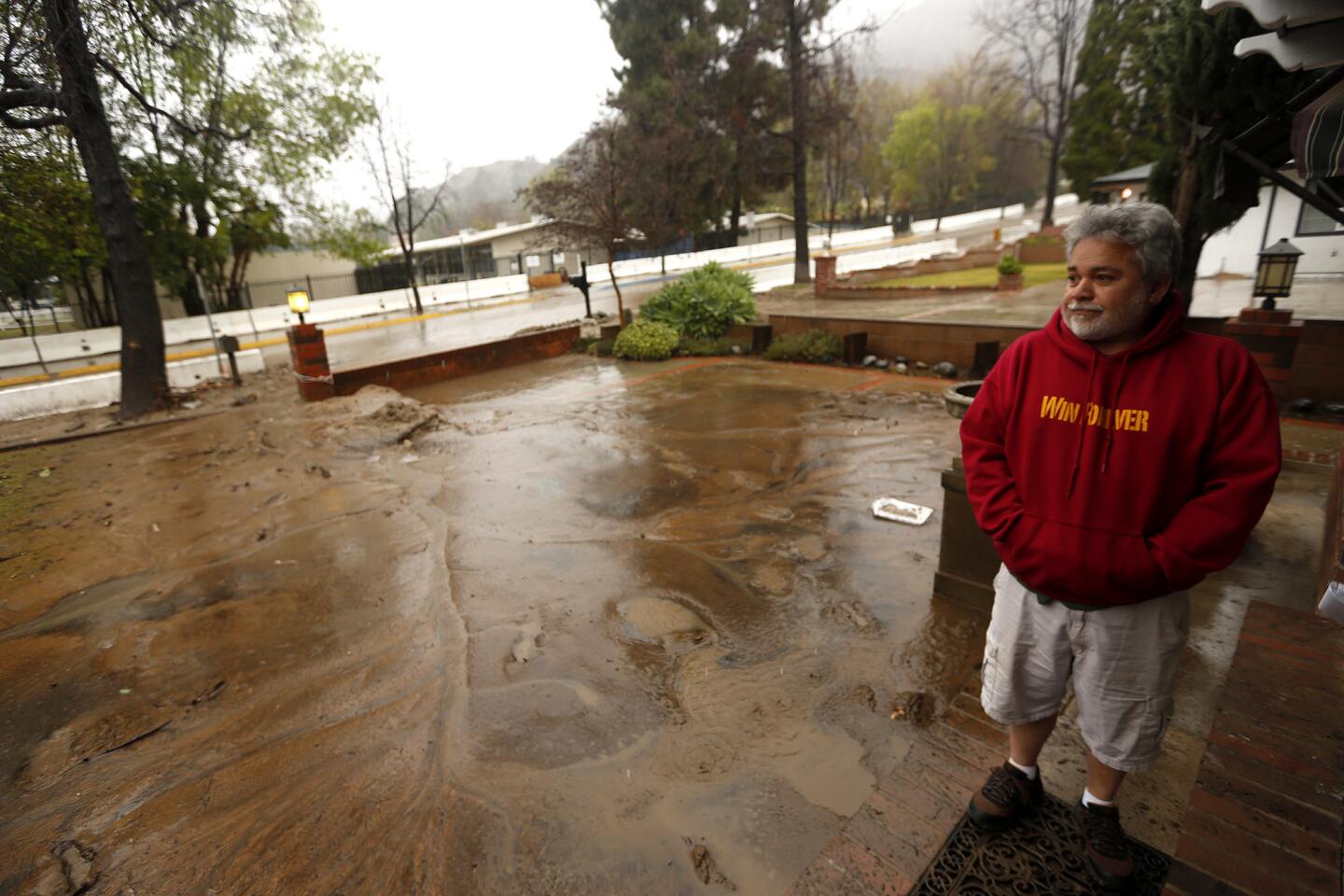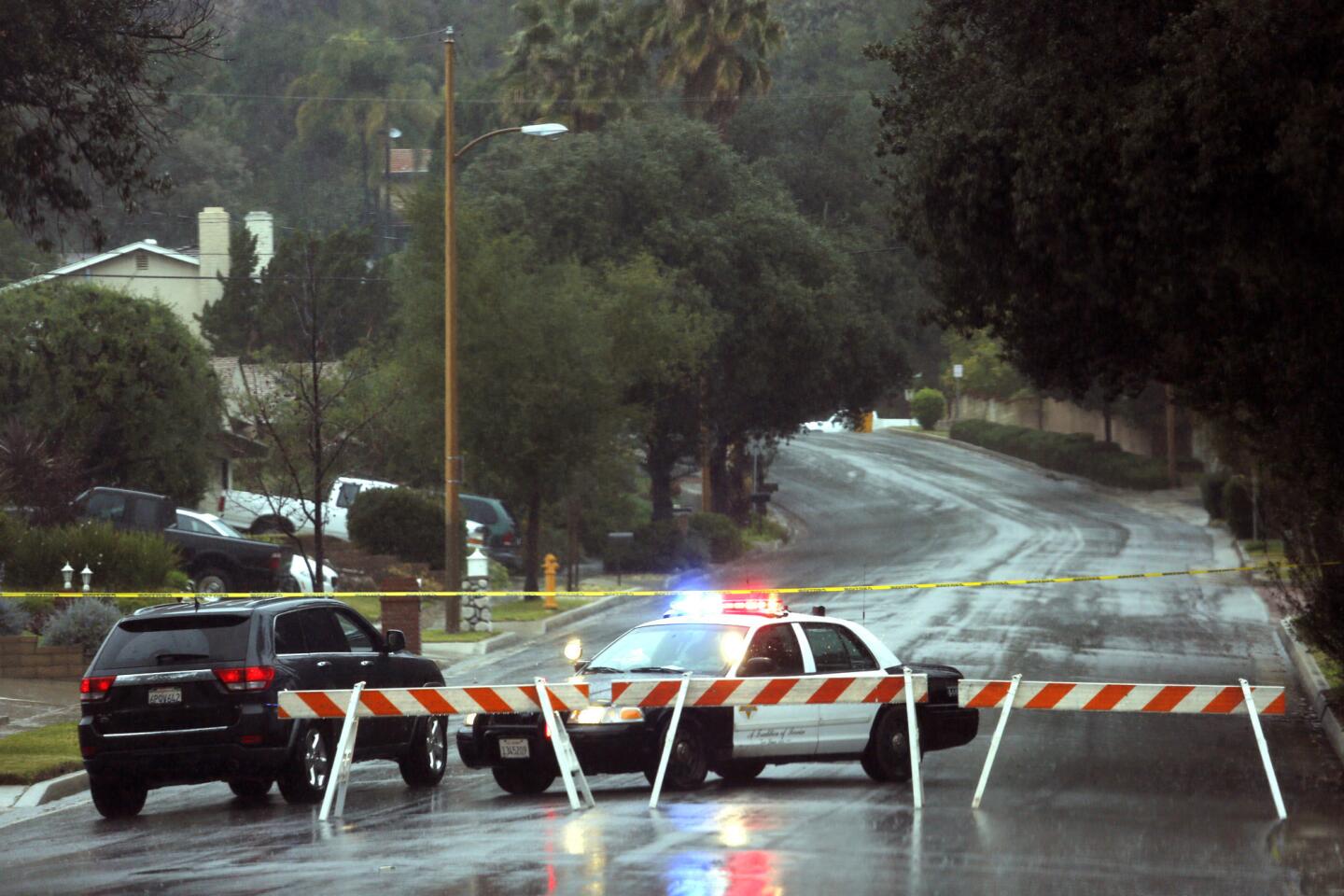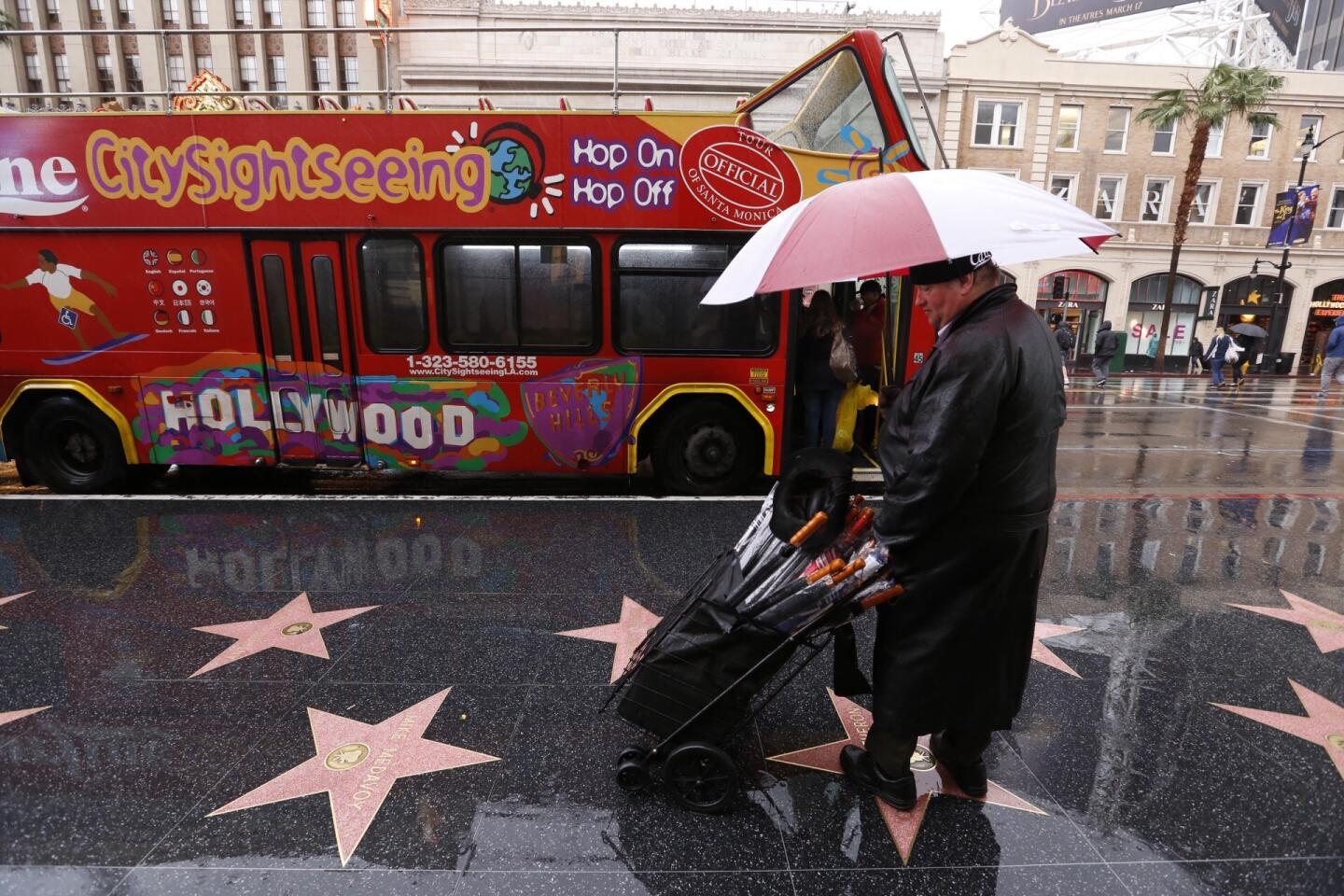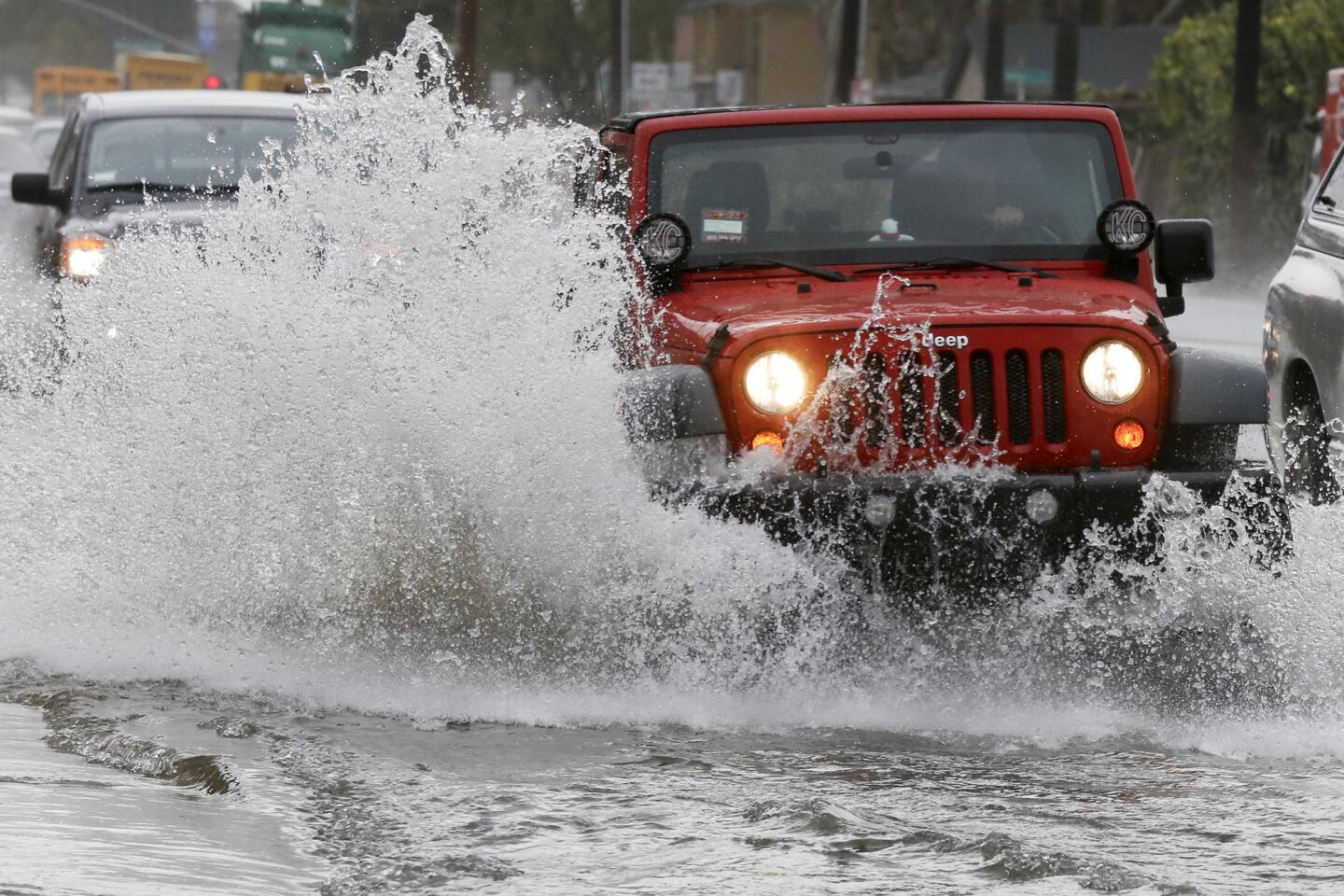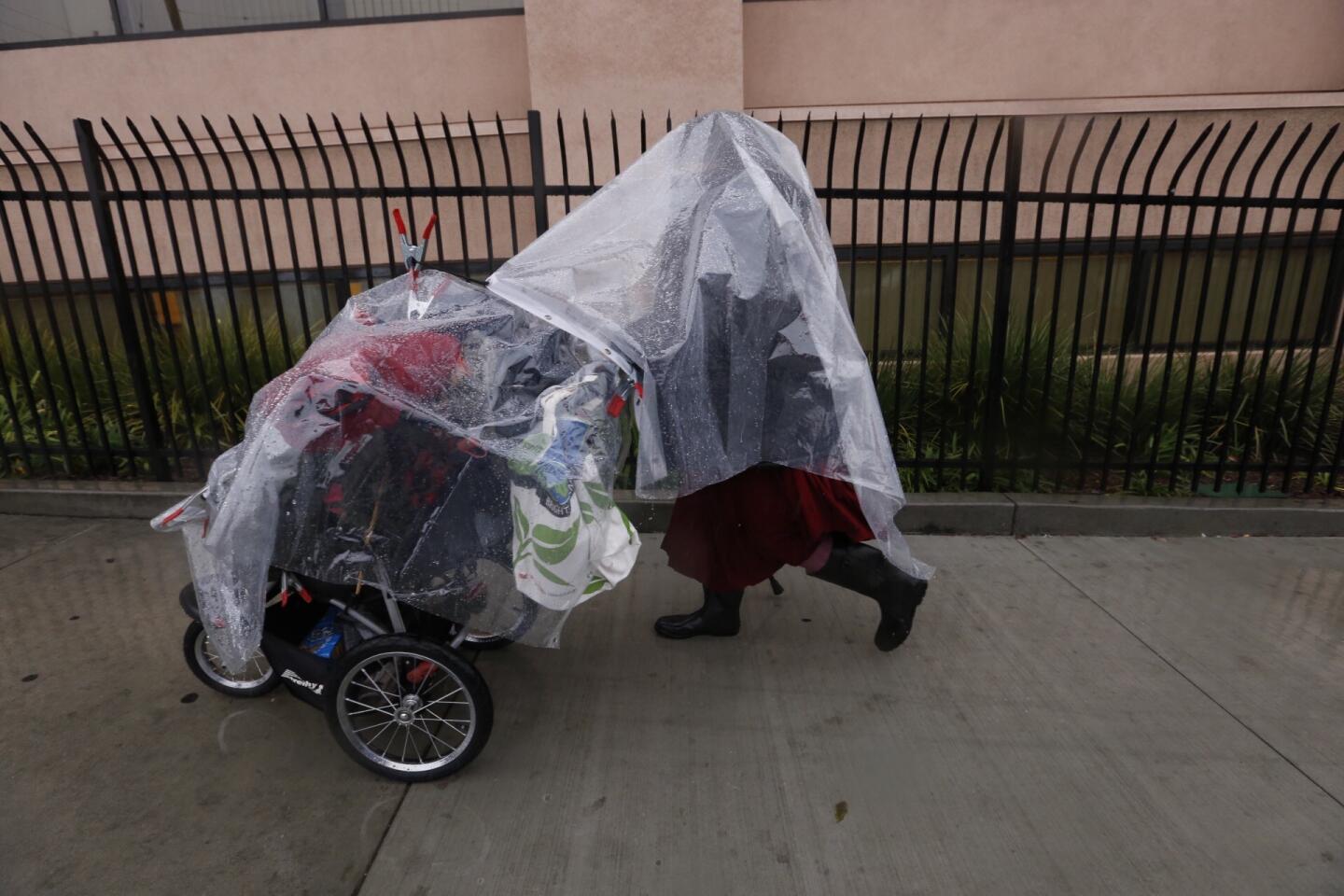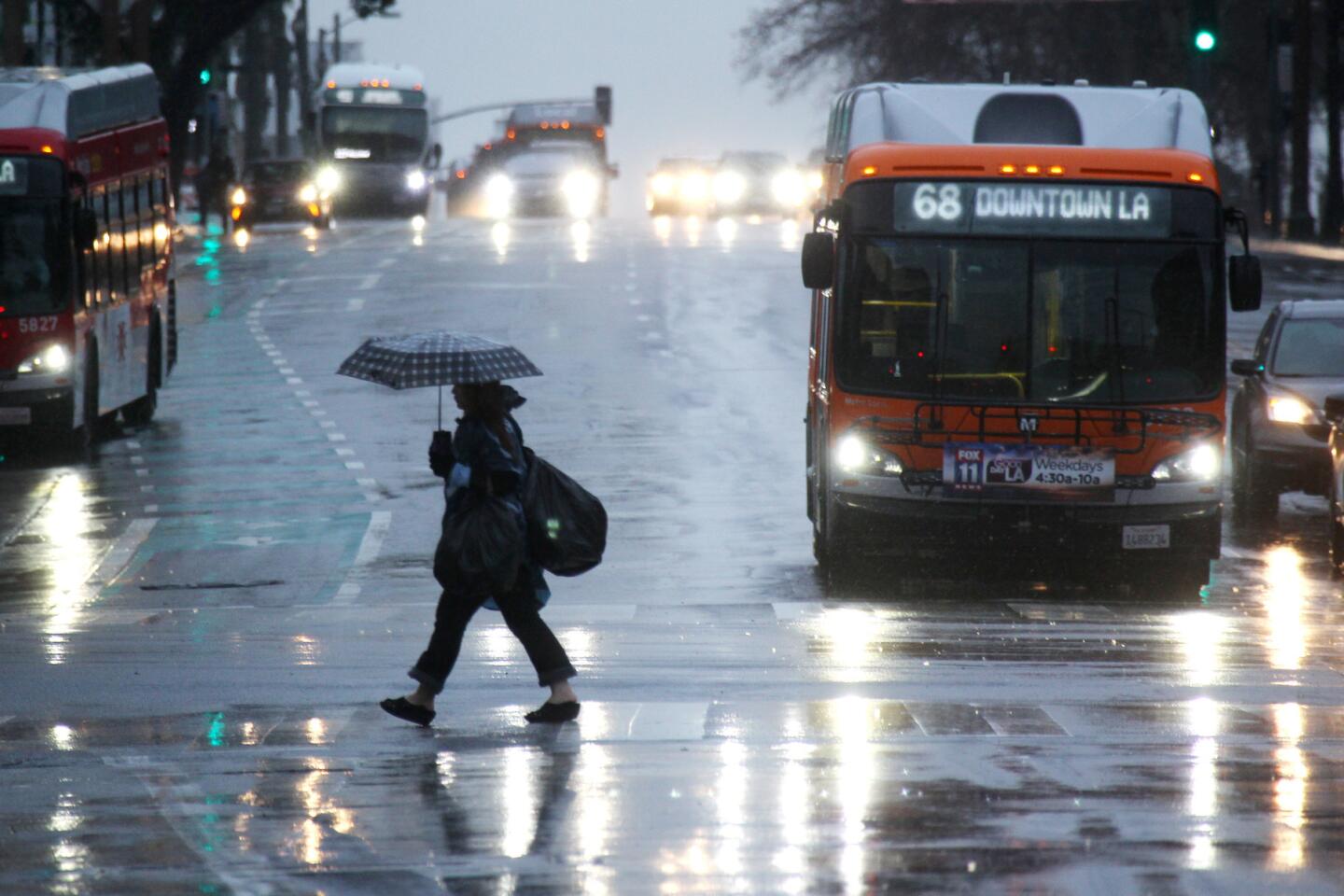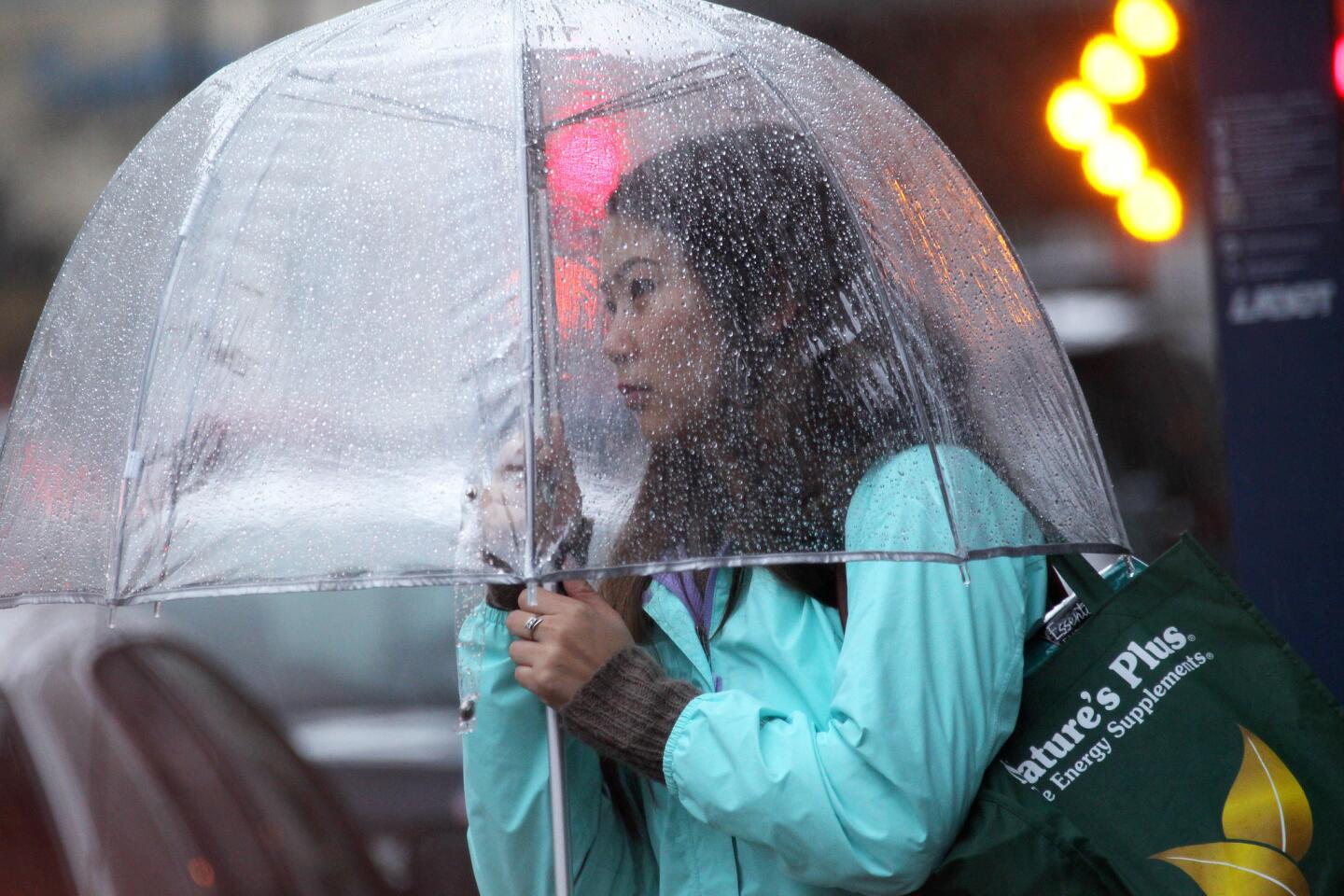Widespread flooding, mudslides, evacuations as biggest storm in years batters California

Flooding along the boardwalk in Seal Beach after rainfall and high surf.
- Share via
The third in a series of powerful winter storms unleashed a deluge in Southern California on Sunday, flooding numerous roads and freeways, setting new rainfall records and stranding some in dangerously rising waters.
Forecasters had predicted this storm would be the strongest and several years, and it didn’t disappoint. While earlier storms produced periods of heavy showers, this one delivered several hours of sustained pounding rain, with damaging results.
Coastal areas of Los Angeles County were among the hardest hit, with Long Beach Airport setting a new all-time rainfall record, 3.87 inches. The intense rain was too much for local roads. Sunday afternoon, both the 110 Freeway in Carson and the 710 Freeway in Long Beach were shutdown due to extreme flooding that left cars stranded like islands in a lake.
In Long Beach and surrounding communities, dozens of intersections were flooded and some residents reported their parked cars were damaged as the rainwater kept rising. Across the region, several people were rescued from their cars and thousands lost power.
Brett Albright, a meteorologist with the National Weather Service’s office in San Diego, said the storm dumped as much as four inches of rain in some places.
“Today was very intense,” said Albright. “It’s not a normal event. It was definitely a culmination of the perfect circumstances: We had a very intense atmospheric river with a lot of moisture and an area of lift in the atmosphere right over coastal Los Angeles and Orange counties. It forced all of that moisture out.”
“It’s not often we see higher rainfall totals on the coast than in the mountains,” he said.
Southern California has been mired by a 5-year-drought. But this storm is part of a larger shift toward wetter conditions that began last fall. Since October 1, downtown L.A. has received more than 13 inches of rain -- 216% of normal rainfall for this period, which the National Weather Service said was 6.26 inches.
Officials said much of the Southland remains in drought, although recent storms are helping.
On Sunday, the brunt of the storm hit in the afternoon.
Rockslides closed roads in Malibu and other coastal mountain areas. Up the coast in Isla Vista, a cliff and a patio collapsed into the ocean. Rescuers had to evacuate 15 to 20 residents of ocean-front apartment units, according to Gina DePinto, a spokesperson for the County of Santa Barbara.
At least one fatality was believed to be linked to the storm. A motorist in Pomona was driving about 3:15 p.m. amid heavy rains, lost control of the vehicle and smashed into a telephone pole, according to the Pomona Police Department. The driver suffered major injuries and was pronounced dead by Los Angeles County paramedics. The person’s name was not released pending notification of family members.
A homeless encampment off of the Pacific Coast Highway in the Harbor City neighborhood was submerged in several feet of water. Los Angeles fire rescue teams helped three people walk out of the flooded area and brought two others out by boat, officials said.
One of those rescued, a 39-year-old man, was transported to a local hospital. Swift-water rescue teams were still searching the area, a roughly 300-square-foot patch of land with dense vegetation off the highway, for other victims late Sunday afternoon.
Some of the biggest concerns about the storm came from the communities hit by wildfires last year. Heavy rains can cause mudslides in burn areas, and some officials urged residents to evacuate.
Evacuation orders were issued for burn areas in Glendora, Duarte, Silverado Canyon in Orange County and parts of Santa Barbara County.
As of Sunday night, most of the hillsides had held up, to the relief of anxious homeowners.
In the Duarte burn area, many residents chose to stay in their homes. Rudy Fuentes, an elementary school teacher, said he decided to stay behind to protect his home in case things really got out of hand.
“I hope it doesn’t come to that,” said Fuentes, whose driveway was covered in about two inches of mud. “We just decided to stick it out.”
Jerry Katz, a 25-year resident of the neighborhood, wasn’t worried at all about the situation. He didn’t put down any sandbags or dig any trenches. He blamed the city’s orders to leave on nervous lawyers.
“The real problem is I can’t take my son to Cheesecake Factory tonight,” Katz said.
Orange County officials remained on guard, particularly in Silverado Canyon, which is still recovering from a nearly 1,000-acre fire in 2014. Extra emergency crews have been brought in to help, including a bulldozer operator and two additional swift-water rescue teams.
“The ground still remains pretty saturated and … it can be problematic,” said Capt. Alan Wilkes, of the Orange County Fire Authority.
The epic rains caused something very unusual at Disneyland Sunday -- a quiet day with small crowds. As heavy rains poured and a flash flood warning was issued, the sparse number of guests hid under the monorail.
Some were clearly unprepared for the rain — wearing jeans, sneakers and hoodies, with some even without umbrellas. “Star Wars” lightsaber umbrellas were selling briskly, despite a hefty price tag of $65.
But the visitors who braved the weather enjoyed short lines — less than half an hour for Hyperspace Mountain, where lines typically can last for 2 hours.
Thunderstorm conditions were expected to ease slightly late Sunday into Monday. But the rainfall is expected to continue until Tuesday.
In all, the storm system is expected to generate 4 to 6 inches of rainfall over the next three days, with the most rainfall in the foothill and mountain areas. Clearer skies and temperatures in the mid to high 60s are expected to return beginning Friday.
The storm also caused problems in Northern California, which has seen a series of major storms over the last few months that lifted much of the region out of drought.
Mudslides and snow closed major roads including Interstate 80. U.S. 395 and Highway 17, the main freeway linking Silicon Valley with Santa Cruz.
Monster surf on Saturday set a new wave height record for the Monterey Bay: 34.12 feet, according to the NWS. The previous record was 32.8 feet, set in 2008. Those conditions smashed the remains of the famed concrete ship, the S.S. Palo Alto, in the Monterey Bay town Aptos.
Times Staff Writers Rong-Gong Lin II and Joseph Serna contributed to this report.
ALSO
Heavy snow forces closure of I-80 in the Sierra Nevada
As California goes from drought to deluge, a dangerous old foe returns: mudslides
UPDATES:
8:55 p.m.: This article was updated with additional background on the storm system and minor editing.
6:45 p.m.: This post was updated with details on surf conditions in the Bay Area.
6:15 p.m.: This post was updated with preliminary rainfall totals.
5:10 p.m.: This post was updated with more details about a swift-water rescue in Harbor City.
4:30 p.m.: This post was updated with details on the rainstorm at Disneyland and elsewhere.
3:30 p.m.: This post was updated with more details about flooding.
2:55 p.m.: This post was updated with details on flooding and the issuing of a flash flood warning.
1:40 p.m.: This post was updated with more detailed information about evacuations.
1:10 p.m. This post was updated with new information regarding evacuations.
12:45 p.m.: This post was updated with new information from the National Weather Service.
11:20 a.m.: This post was updated with new information about flooding preparations in Orange County.
10:35 a.m.: This post was updated with new information regarding the Hermosa Beach Pier.
9:30 a.m.: This post was updated with new information about evacuations in Duarte.
9:10 a.m.: This post was updated with conditions in Northern California, including Highway 17.
8:20 a.m., Jan. 22: This post was updated with a forecast, and developments in Northern California.
11:30 p.m.: Updated with news of more evacuations.
8:55 p.m.: This story was updated with new information about evacuations in Santa Clarita.
5:50 p.m.: This story was updated with new information from the National Weather Service.
3:40 p.m.: This story was updated with snow and surf forecasts.
This story was originally published at 11:55 a.m. Jan. 21
More to Read
Sign up for Essential California
The most important California stories and recommendations in your inbox every morning.
You may occasionally receive promotional content from the Los Angeles Times.
